Language Exchange Partners: The Ultimate Guide
“How can I find someone to speak my new language with?”
At Fi3M, we hear this question all the time. This makes sense as we encourage language learners to speak from day one.
There is an easy, free way to speak your target language: online language exchanges.
With a language exchange, you find someone who speaks the language you’re learning. You spend some time chatting with them in English. In return, they spend some time chatting with you in your target language.
When language exchanges go right, they’re one of the best things you can do to improve your language skills and boost your confidence.
But there are a few things that can make the experience less than ideal.
My first ever language exchange partner was Italian. At the time, I had no idea what I was doing or what a language exchange even was. I just knew that I needed help improving my Italian. I didn’t personally know anyone who spoke the language, so I reached out on a language exchange platform.
It went okay, but it could have gone a lot better. I made a ton of mistakes – the biggest was that we spoke English almost the whole time (even when we were meant to be speaking Italian).
I now have hundreds more exchanges under my belt and have tried out dozens of language exchange platforms. I’ve learned what makes a good language exchange, and the many things that can go wrong. I’ve decided to share it all because I want you to get the most out of your language chats right away.
Here’s what I’d like to show you:
The Ultimate Guide to Finding a Language Exchange Partner: Table of Contents
Here is EVERYTHING you’re about to learn in this guide…
What is a Language Exchange Partner?
- Study buddy vs language exchange — what’s the difference?
- Language Tutor VS Language Exchange Partner
- Will a language exchange really teach you the language?
- How language exchanges make you a smarter language learner
What is a Language Exchange Partner?
- Language exchange partners: friends with benefits?
- Exchange Partners vs. Tutors: Which is Better?
- Two-timing your language exchange partner — is that really okay?
- Group Language Exchanges
Language Exchange MISTAKES Most Language Learners Make
- Talking to random people on the street
- Forgetting that it’s an “exchange”
- Blank profile
- Copy-paste introductions
- Meeting once – then not setting a date for the next meeting
- Giving up too soon
- Failing to Build Rapport Before Your Call
- Do You Make Any of These Mistakes?
Part 1: Find a Language Exchange Partner
- iTalki: Why we think this particular platform is #1
- How to Find “Right Fit” Language Exchange Partners — A Step-by-Step Guide
- What are Some Good Language Exchange Apps?
- Other Places to Find Language Exchange Partners
Part 2: Organize a Language Exchange
- Tip #1: Make your profile engaging
- Tip #2: Craft a “Hello” Message that Gets a Reply
- Tip #3: Making sure you’ve found the right partner
- Tip #4: Making sure you’re a good language exchange partner
- Tip #5: Move Text Conversations to Voice Chat
Part 3: The Day of the Exchange is Here. What Now?
- The tech
- The first conversation
- How to Get the Conversation Started
- How to keep the conversation going
- The most important thing you need to do before you hang up
Part 4: Scripting: the Secret to Success
Part 5: Conversation Exchange Topics
Important Last Steps: How to Make the Most of Every Language Exchange
Other Questions about Language Exchanges
- What if someone is harassing me?
- What if my partner keeps using English?
- What if I really mess up or say something embarrassing?
Finish Strong: Crucial Last Steps
If you’re ready to just dive in, then read on.
What is a Language Exchange?
Conversation exchange, intercambio, tandem, language exchange – this activity goes by many names. But regardless of what you call it, what exactly is this activity? Just what do you do in a language exchange?
A language exchange happens when you spend time chatting with someone in your target language. In exchange, you spend time chatting with them in English (or another language you know that they’re learning).
For example, if you’re learning Korean, then your language exchange partner will talk with you in Korean. Typically, this exchange partner would be a native Korean speaker. Though they may be another Korean learner who is at a more advanced level than you.
And then here’s where the exchange part comes in.
In exchange for them chatting with you in your target language, you will chat with them in their target language. This again will likely be your native language or a language that you speak at a high level.
To continue our example, if your native language is English, then you’d spend time chatting with your Korean exchange partner in English as well as Korean. You do this because they want help learning English.
Typically, you’d give equal time to each language. So if you booked a 30-minute session with your Korean exchange partner, you’d spend 15 minutes chatting in English and 15 minutes chatting in Korean.
You might be thinking: “That sounds just like a study buddy. Is it the same thing?”
Study Buddy vs Language Exchange Partner — What’s the Difference?
With a language study buddy, you are both learning the same language. For example, you and your study buddy are both learning Spanish, so you spend time together studying the language.
You could do conversation practice with a study buddy. If you’re both learning Spanish, you could hold a conversation in Spanish. But this wouldn’t really be a language exchange, because you’re not swapping or exchanging languages.
Okay, but what about my language tutor? Are they an exchange partner?
Language Tutor VS Language Exchange Partner
A language tutor isn’t a language exchange partner. There is an exchange happening – money for language tutoring, but there is no obligation on your part to help your tutor with their language(s). You get help for the money you spend.
Tutors are a good option when:
- You’re short on time. When this is the case, it’s a better use of your time to hire a tutor, as you won’t have to give time to helping a language exchange partner.
- You want professional feedback. Many (but not all) language tutors are professionally certified and/or have a lot of experience, so they’ll give you in-depth feedback on your speaking skills, and on how you can improve.
- You want help with grammar. Tutors are able to explain grammar rules and break things down – a skill that not many language exchange partners possess.
Will My Language Exchange Partner Teach Me the Language?
No. It is not the responsibility of your language exchange partner to teach you a language.
Instead, you are responsible for doing the learning on your own in between exchange sessions. An exchange partner offers you the opportunity to practice what you’ve studied. They can also point out obvious errors or provide correct examples.
And they make you a smarter language learner…
How Language Learners Make You a Smarter Language Learner
By taking part in language exchanges, you will…
1. … Grow in Confidence

I've always struggled with confidence. Performance anxiety was something that I faced daily – especially as I’m a musician.
It was tough and it infiltrated almost every aspect of my life.
I knew that overcoming it was essential to being able to do what I wanted – perform music (and later on, learn languages).
I began taking steps to work through any nervousness I was feeling. Language exchanges played a big role in helping me build my confidence.
So, if you’re feeling a little unsure about putting yourself out there and using your new language in front of someone else, a language exchange partner is a good next step.
Think of it this way. Your language exchange partner is in the same boat as you. They’re navigating the waters of a foreign language, so they likely know how you’re feeling. There’s a good chance they share your nervousness.
Your anxiety about speaking your target language may never fully go away. And in some situations it’s helpful to feel a little nervous.
Language exchanges are a good way to start facing your fears and step out of your comfort zone. When you do, your confidence will grow and grow.
2. … Feel Less Silly About Making Mistakes



Does the thought of making mistakes in your target language terrify you?
We tend to amplify our mistakes because of something called the “spotlight effect“. It’s something most of us have felt.
If you've ever discovered a stain on your shirt that you've walked around with all day, your first thought was probably, “how many people noticed?” You feel like there’s a spotlight shining on the things that embarrass you.
Because we experience things from our own perspective, we often believe that everyone else is focused on the same things that we are. So when we make mistakes or have an embarrassing stain, we think that everyone noticed them the same way that we did and that they feel as negatively about it as we do.
But really, everyone else is experiencing their own “spotlight effect” so they're paying more attention to their own mistakes and that often means that they might not even notice yours. Even if they do notice, it’s probably not a big deal for them.
No one really cares if you make mistakes except you. If you use the wrong tense, the wrong word, or the wrong sentence structure, it's okay. No one is going to laugh at you – especially not a language exchange partner.
That said, you do want a language exchange partner who pays attention to what you’re saying and is willing to give feedback.
One of the great things about language exchange partners is that when they notice your mistakes it's not so they can make fun of you or judge your language ability. It's so that they can help you.
Remember, mistakes don't mean you're a bad language learner. They mean you're a language learner in progress.
3. … Know Exactly What to Learn Next



With a language exchange, you’re using your target language in real conversations.
That makes it really easy to decide what to study next. You just ask yourself the question: “What would I most like to chat about in my target language?”
For example, when you're getting ready for your first language exchange, you’ll probably want to get to know your language exchange partner, and telling them a little bit about you.
So you’ll need to make sure you know how to do this.
Even if you have no prior experience with the language, learning a few introductory phrases such as…
- Hi. My name is.
- Nice to meet you.
- I'm from _. Where are you from?
- I work as a _. What do you do?
- I am/am not married. I have/don't have kids. What about you?
… are a great way to get off to a running start.
To take this a step further, you can also ask your language exchange partner what they would like to chat about.
4. … Know Someone Has Got Your Back


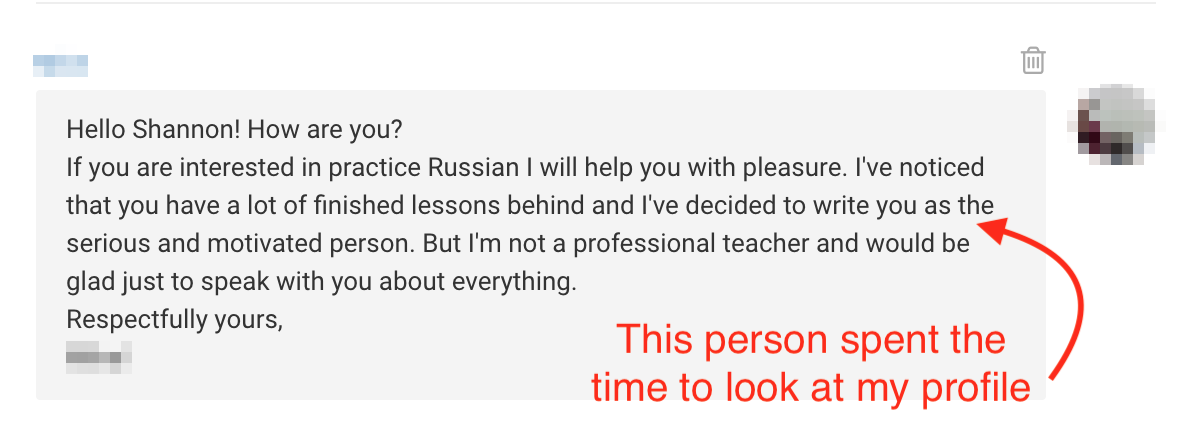
A language exchange partner is a buddy who shares your interest in language learning. They'll understand any frustrations you feel, your enthusiasm for figuring things out, and will be able to offer advice when you feel stuck.
5. … Get Feedback on What’s Good (And What You Need to Improve)



I’ve learned all my languages through self-study. I’ve found it to be the most effective way to learn.
Though sometimes I’ve wondered “am I doing this right?” or “am I focusing on the right things?””
When I’ve got these questions, I go to my language exchange partner, and I ask them what they think. I’ve found their feedback to be invaluable.
They’ll tell you where you’re doing well, and what you need to work on.
So what are you waiting for? Let’s get you sorted with a language exchange partner.
What is a Language Exchange Partner?
A language exchange partner is the person who takes part in the language exchange alongside you. But they're so much more than that.
Language Exchange Partners: Friends with Benefits?
Having a language exchange partner means having someone else who is invested in your learning. If you're still interested in keeping up your language, then you'll continue being interested in showing up to your exchanges. And that's something that's certainly in the interest of your partners.
They can also empathize with you. They know the struggles you're facing from first-hand experience. A language exchange partner is certainly a friend with benefits!
All joking aside, language exchange partners do have a lot of serious benefits. What are they?
With a language exchange partner, you will:
Get the Opportunity to Actually Speak Your Language
A lot of language learning is done alone. And unless you're proactive in looking for ways to practice speaking your language when you're on your own, you may not have much opportunity to train this core language skill.
When you take part in a language exchange, you have to speak your language. That means it's a great opportunity for speaking practice.
Get Real-World Experience of Your Language
Many of the language learning resources we use to learn languages are built around dialogues or passages describing very specific scenarios. And while it may be helpful to learn how to check-in to a hotel or buy a train ticket for that one day you take a trip to the country, they don't offer much help when it comes to casual conversations or making friends.
When you chat with a language exchange partner, you get to try out using the language beyond travel or work situations. You get to practice having conversations in your language much like you would in your target language and get real-world exposure to how the language is used.
Practice Your Listening Skills
When your half of the exchange rolls around, you'll have the chance to hear the language as much (if not more) as you'll get to speak it. This is excellent listening practice.
There's a good chance that your partner will speak at a normal speed rather than at the slow pace of most language learning audio tools. So you'll get to hear the language at real-speed. And if they are talking too fast, you can ask them to slow down.
Build Muscle Memory
Speaking is the core language skill (the others being listening, reading, and writing) that many learners find the most difficult because it requires not just production in a language, but also the training of the muscles in your mouth, throat, and face. If you don't practice speaking, you don't train those muscles to coordinate to create the sounds you need to communicate in your language. And without practice, speaking can feel awkward.
An exchange partner provides you with a safe environment to train those muscles. They're learning a language too, so they understand exactly what you're going through. They won't laugh as you try to pronounce the French u or the Russian ы.
Save Money
Most language exchange platforms offer free services to users. There are a few platforms that are paid, but the majority of language networking sites are free. So language exchanges are easy on the pocketbook.
Make New Friends
Language exchanges often develop into friendships. And friendships can mean you have someone to meet up with if you ever have the chance to go to the country, someone who offers an intimate view of your language's culture, and a good reason to keep up the language. But best of all, you have a new friend.
Learn About Another Culture
When you meet with language exchange partners, you have a chance to get a more up-to-date view of the culture tied to your language than any other resource can offer.
You can ask for recommendations for books, films, TV series, or music. You can find out what it's like to live in the country today, what people your age do for fun, and so much more.
Learn the “Nonverbal Cues” in Your Target Language
When you meet with someone online, even if you're only seeing them on video, you still have the opportunity to pick up non-verbal cues for the language you're learning.
Pay attention to facial expressions, body language, or gestures, and you’ll pick up tons about how the language is used beyond words.
Stick With It — Even When You’re Not Feeling It
When you have a language exchange partner, you have someone you're accountable to. And when that's the case, you're much more likely to do the work. You want to bring something new (and improved) to each of your exchanges.
It’s much easier to do the work when you have someone counting on you to do it.
“This ‘language buddy’ system was a perfect platform for me needing to practice Arabic with a real-life Arabic speaker and then for me to repay the service with conversational English practice. I went from no-go situation to a win-win situation in a matter of weeks, literally!” – Marie Ryan
Exchange Partners vs. Tutors: Which is Better?
Language exchange partners and tutors can help you in different ways, so it doesn't need to be a question of choosing just one or the other. But, there is some overlap.
Here are some of the pros and cons for each:
Pros of a Tutor
- You get professional feedback
- When you struggle with grammar or pronunciation, a tutor can explain how to do it right
- You get all of the attention and time
Cons of a Tutor
- Cost. While some tutors charge as little as $10 per hour, others are $50+ per hour
- Inflexibility. Tutors can be set in their teaching methods and won't want to do things your way
- Too much English. Some tutors teach in English rather than keeping the majority of the lesson in your target language language
Pros of a Language Exchange Partner
- Cost. Exchange partners are free to chat with
- You do it your way. They won't try to walk you through a coursebook
- You get to use and hear the language in a real-world context
- You have the opportunity to form friendships
- You get listening comprehension practice
- You get to learn about the people who speak your language and the culture tied to it
Cons of a Language Exchange Partner
- You have to share the time and attention
- They often can't explain grammar or pronunciation to you
- There's the possibility that you'll waste your time and feel like a volunteer teacher if your partner doesn't treat the exchange fairly
- You're on your own to figure out what's next and a structure that will help you
- You need to have a basic level in the language to make the most of them
Ultimately, the decision is up to you and what is best for your situation — though I’ll show you strategies for dealing with some of these cons later on.
Two-Timing Your Language Exchange Partner — Is That Really Okay?
A language exchange partner is a valuable asset (and friend) to have as a language learner. And while they don't cost money, they do cost time. So asking yourself whether or not having more than one language exchange partner is the right answer – for you – is an important step.
First, let's look at the reason you may want to have more than one exchange partner:
More Practice
There's one very obvious benefit to having more than one language exchange partner – you get more practice. And not only do you have more opportunities to practice the language overall, but the more opportunities you'll have to practice the same things.
As a beginner particularly, this is important. The more you practice something, the better you instill it.
If you have just one language exchange partner, there's a good chance that they won't want to have the same conversation with you more than once. Especially not introductions. Once they're done, they're done.
When you have more than one exchange partner, on the other hand, you do get to have those conversations more than once and get that extra practice in.
Different Voices and Accents
When you chat with different exchange partners, you'll hear different voices. And you'll hear slightly different accents, too. When you talk to people of different genders, different backgrounds, of different ages, and from different areas, you expose yourself to a multitude of ways the language is used by native speakers. Every person is going to use different words in certain cases, describe things differently, and they'll do it in their own unique voice. All of this exposure adds up to offer you some serious listening comprehension training and improves your overall familiarity with the language.
More Frequent Practice
When you and your exchange partners have trouble meeting up regularly because of different time zones or schedules, it helps to have more than one partner. When one partner can't meet a certain week, you can still meet with another so that you don't have to skip whatever practice time you had planned.
Group Language Exchanges
Some online language exchange platforms offer group language exchanges in addition to one-on-one exchanges. These are often a group of learners only (and occasionally a native speaker or two). But is a group language exchange right for you?
Here are a few reasons you might consider a group language exchange over a one-on-one exchange:
- You don't have the pressure of carrying half the conversation, instead you can join in when you feel ready.
- You get to compare notes with a larger group of learners so you get exposure to more ways things can be said.
- Group exchanges tend to include groups of people all learning the same language so you get to benefit from the experience of those a little further along than you.
If you feel nervous about doing a one-on-one exchange, groups are a good way to get your foot in the door. However, you do need to be careful when taking part in these types of exchanges. If you're nervous about speaking, it's easy to let the other participants fill up the time and hang back without saying much.
If you decide to participate in a group exchange, I recommend being brave and jumping in fully! You can also let your partners know that they may need to encourage you directly to respond (because you're nervous).
Now that you know what a language exchange partner is and how they can help you, let's talk about some of the mistakes language learners make when looking for an exchange partner.
The Language Exchange MISTAKES Most Language Learners Make
It’s easy to get a language exchange wrong — and in fact, most people do. Here are the mistakes you want to avoid:
Talking to Random People on the Street
Chatting with random strangers can be a lot of fun, and it’s a great way to build your confidence. But it’s a terrible way to look for a language exchange partner.
Imagine this. You're learning Korean, and you’ve psyched yourself up to head out to a Korean restaurant. You arrive, spend some time getting your bearings, and finally end up in a situation where you can try out your language.
You stroll up to one of the staff team, take a deep breath and say, “안녕하세요!”
The person turns, looks at you and says, “Oh, you speak Korean?”
Hmm… you think. So you try again. “한국어를 조금 할 수있어요.” I speak a little Korean.
“Wow, that's really cool!” they say as they slowly wander away.
What happened?
Language exchange partners aren’t random people you meet on the street. Here’s why:
- They're busy doing their own thing and probably don't have the time (or patience) to wait for you to try to get through small talk in their language
- They don't know you and so they have no reason to help you
- You make it apparent you were eavesdropping on them to know they were speaking a language you know and that's kind of awkward
You want to find someone who is a true language exchange partner and not just a stranger out on the street (or staff at a restaurant, hotel, or store). You want someone who is prepared to help you and not someone who you surprised out in the real world.
Forgetting that It’s an “Exchange”
Language exchange partners who hog all the exchange time are no fun.
After you’ve gone through the process of preparing for your exchange in terms of both mental and language preparation, there’s nothing worse than by not getting the chance to practice what you’ve worked on all because your exchange partner “forgets” to switch to your language.
You don’t want to be someone else’s free language teacher when you’re trying to do an exchange. And they don’t want to be yours either.
An exchange means that there is a give and take. So while you’ll have the chance to “take” during your time, don’t forget to “give”, too.
Blank Profile
Let's say you're looking for a language exchange partner. You're browsing the listings of those who speak your target language and hey, look! That person's online right now!
You click on their name to check out their profile to decide if you're a good match and here's what you see:
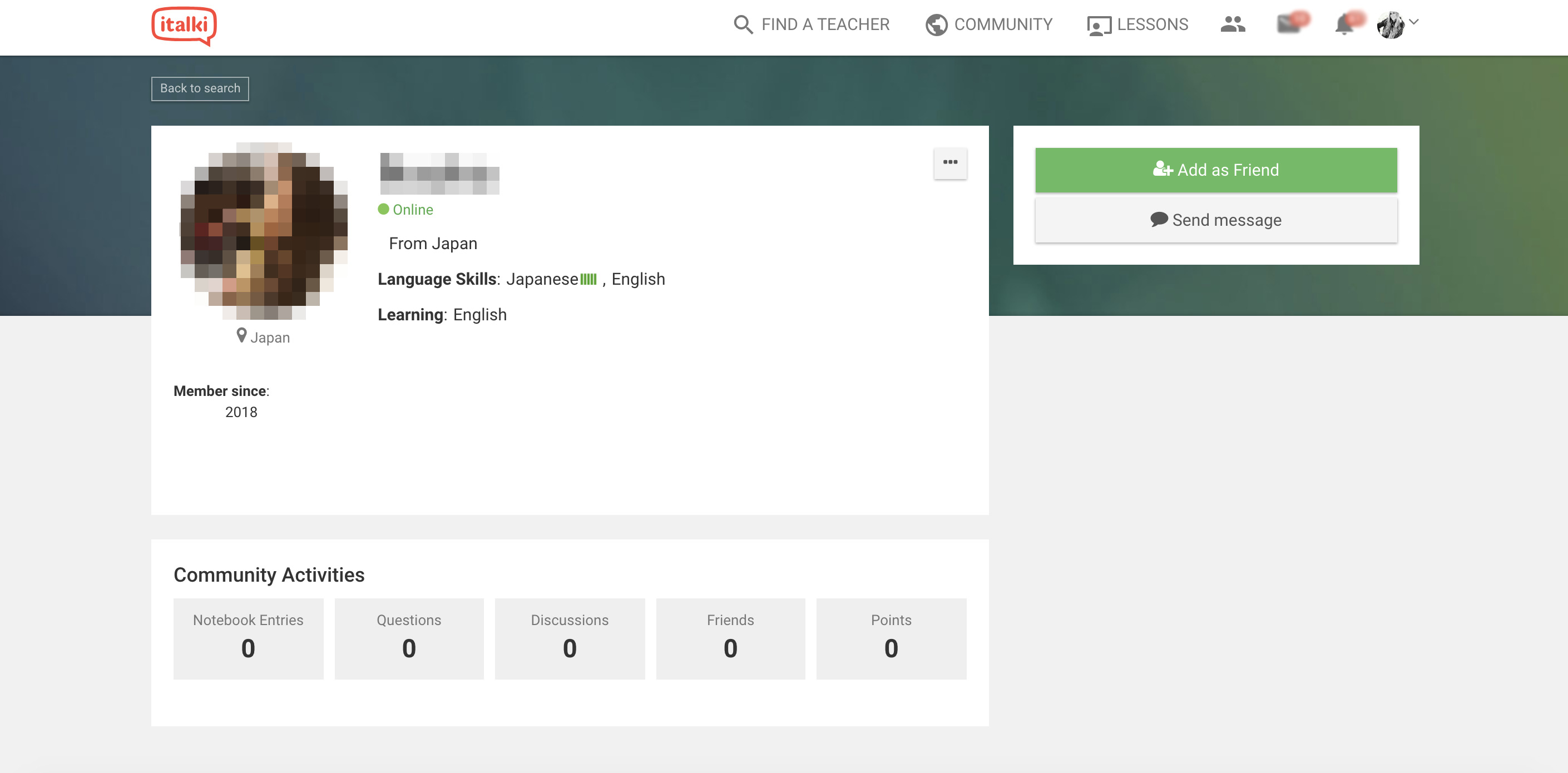
That's not very helpful.
If you want to attract the right language exchange partners, you don't want to be that person with the blank profile!
Whether you're doing the contacting or you're letting people contact you first, you want to make sure you have a well filled out profile. I'll talk more about how to do this shortly.
Copy-Paste Introductions
Don't you hate spam? I do. And not only is spam annoying, but the kind of spam I get often has absolutely nothing to do with me or my interests. It's easy to hit “delete” when I know the message is from someone who knows literally nothing about me.
The same can be said of language exchange introduction messages. I often get messages from people who:
- Speak a language I'm not learning
- Call me “Mr” or “Sir” (I’m female)
- Say something totally inappropriate (no, I don't like hearing that I look “sexy” in my profile picture)
- Don't tell me anything about the person messaging me
It's clear they haven't taken an interest in me and read my profile.
Take these four messages, for instance:
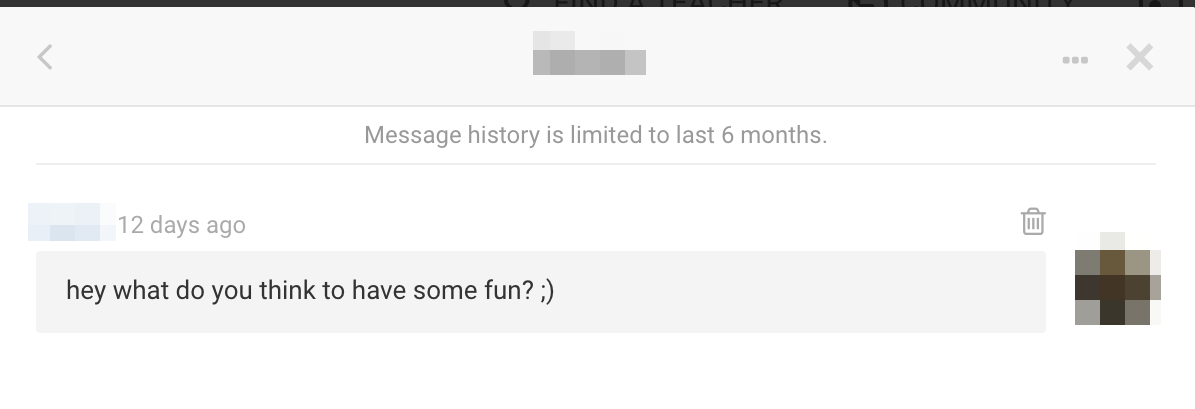
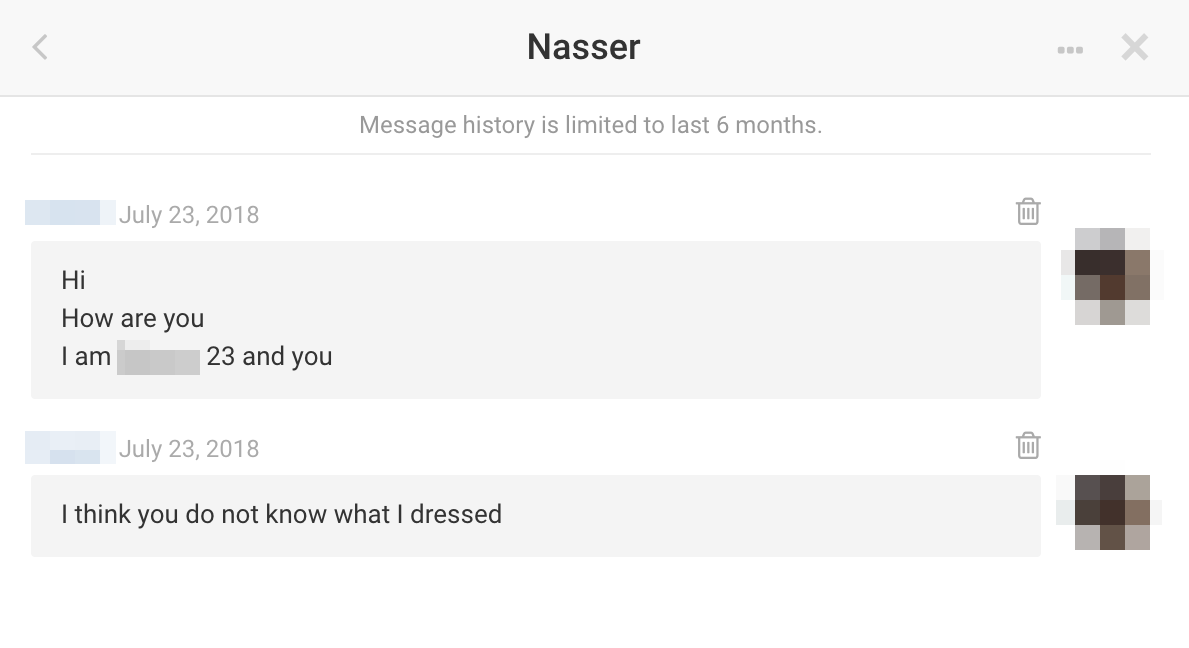
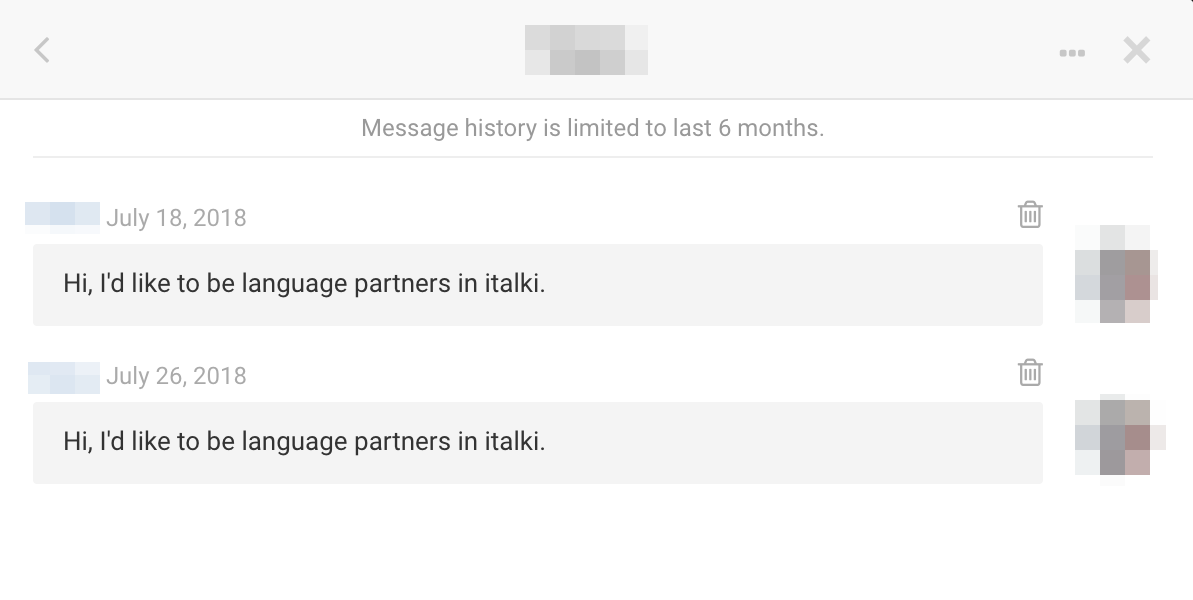
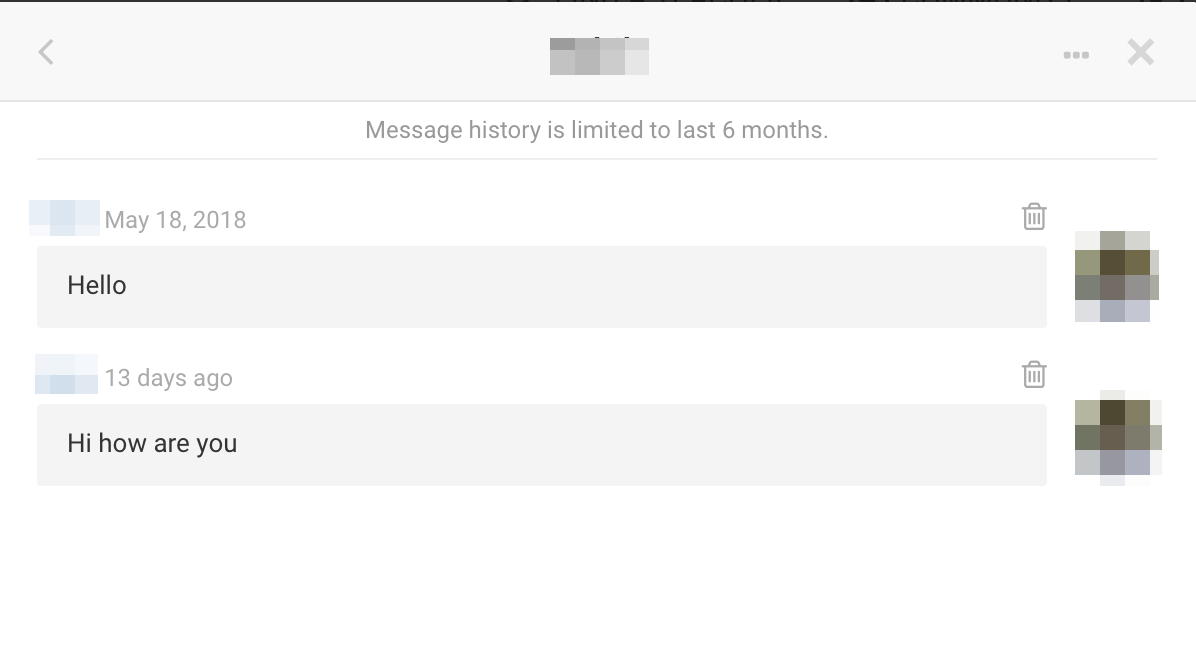
Which do you think I'm most likely to reply to?
When you're reaching out to a new language exchange partner, avoid the temptation to use “copy-paste” and blast out the same message to several different people. Your language exchange partner is someone that you're going to get to know, so do your homework. Spend a little bit of time upfront getting to know them so they know you're sincerely interested in doing an exchange with them.
Plus, when you spend some time up front checking out their profile, you do a better job determining who will be a good language exchange partner and who won't before you start spending time doing the actual exchanges.
You'll save yourself time by not pairing up with completely incompatible matches when you do a bit of investigating before hitting “send” on that very first message.
Meeting Once — Then Not Setting a Date for the Next Meeting
When you find a good connection with a language exchange partner, make sure you put a date in your calendar to meet with them again.
The best way to keep a consistent language exchange calendar is by arranging to meet regularly with your partners. To keep your language fresh and hone your speaking skills, aim to meet at least once a week.
If you're able to chat more than once a week, however, I highly recommend doing so.
Giving Up Too Soon
So your first exchange didn’t go as planned. That’s no reason to call it quits! I can tell you from experience, you will have some language exchanges that don’t go well. The key is to learn from them. See them as a useful experiment rather than a failure. Think about what happened – what went wrong – and why. That way, you’ll be prepared to handle a similar situation in future exchanges.
Failing to Build Rapport Before Your Call
You’ve found a partner, have prepared for your exchange, and despite feeling a bit nervous, you’re feeling a little excited for the call. You login to Skype at the designated time, but your new partner isn’t there. You wait. Finally, after twenty minutes, they show up. They apologize, so you decide not to make it into a thing and so you jump on the call. They start chatting in English and for the remaining time, barely help you with your language. What gives?
After an exchange like that, it’s normal to feel discouraged and perhaps even decide that exchanges aren’t for you.
That’s why it’s important to spend some time getting to know potential partners before you ever jump on a call. You’ll have a better idea of what the person you’re getting into a conversation is like. Are they chatty? Do they keep to themselves? Are they helpful? By spending some time getting to know them through chat first, you’ll have a better idea of how they might treat your exchanges when the time comes.
Do You Make Any of These Mistakes?
If you are guilty of making any of these mistakes, don't worry. I'm going to take you through the process of finding and chatting with an exchange partner step by step with detailed instructions in the next few sections so that you:
- Know where to find exchange partners
- The best way to reach out to them once you find them
- Know how to set up your profile and introduction message so you'll get a response
- Learn when to move the conversation from chat to voice and video calls
- Know what to talk about during your exchanges
- Can keep the conversations going
First, let's cover where you can find a language exchange partner and how to get in touch with them.
Part 1: How to Find a Language Exchange Partner
There’s one place we’ve found is the best for finding language exchange partners…
italki: Why We Think This Particular Platform is #1
I’ll show you how to get setup on italki and start contacting partners in just a moment, but first, let me share why we think italki is #1.
I first heard about italki from Fluent in 3 Months founder Benny Lewis several years ago, and after reading about his experience, I knew immediately that it was exactly what I needed.
Between then and now, I’ve used the italki to meet exchange partners and find tutors, and have racked up quite a few hours with the platform. Here’s what italki offers:
- An active community. italki has a significantly larger active community compared to the other language exchange websites. Some sites attract a lot of sign ups but not a lot of commitment. italki definitely stands out in this respect.
- A wide range of languages. As I mentioned before, italki supports a wide range of languages. This is fantastic when you study less common languages like Croatian, Afrikaans, or even a specific dialect of Arabic.
- Stats and feedback. Not sure if someone you’d like to reach out to is reliable? You can check their stats. For members who take lessons, you can see their attendance data. It’s a quick way to get an idea of your potential partner’s commitment.
- Places where you can share questions or writing practice and get feedback. Doing so is a great way to meet potential language exchange partners without “cold” messaging them.
- Easy navigation. Language exchanges have enough of a learning curve of their own and the last thing you want to do is try to navigate outdated websites to get started.
- It’s free. While tutors require a fee, language exchange partners on italki are free to connect with. The platform doesn’t require subscription fees, so it’s only if you decide to study with a tutor that you’re charged.
Now that you know the why, let’s get into the how.
How to Find “Right Fit” Language Exchange Partners — A Step-by-Step Guide
Getting setup on italki is easy and in less than five minutes, you can be on your way to your first exchange.
Step 1: Visit italki.com and click the “sign up” button.

Step 2: Enter your name, email and password to create your account.
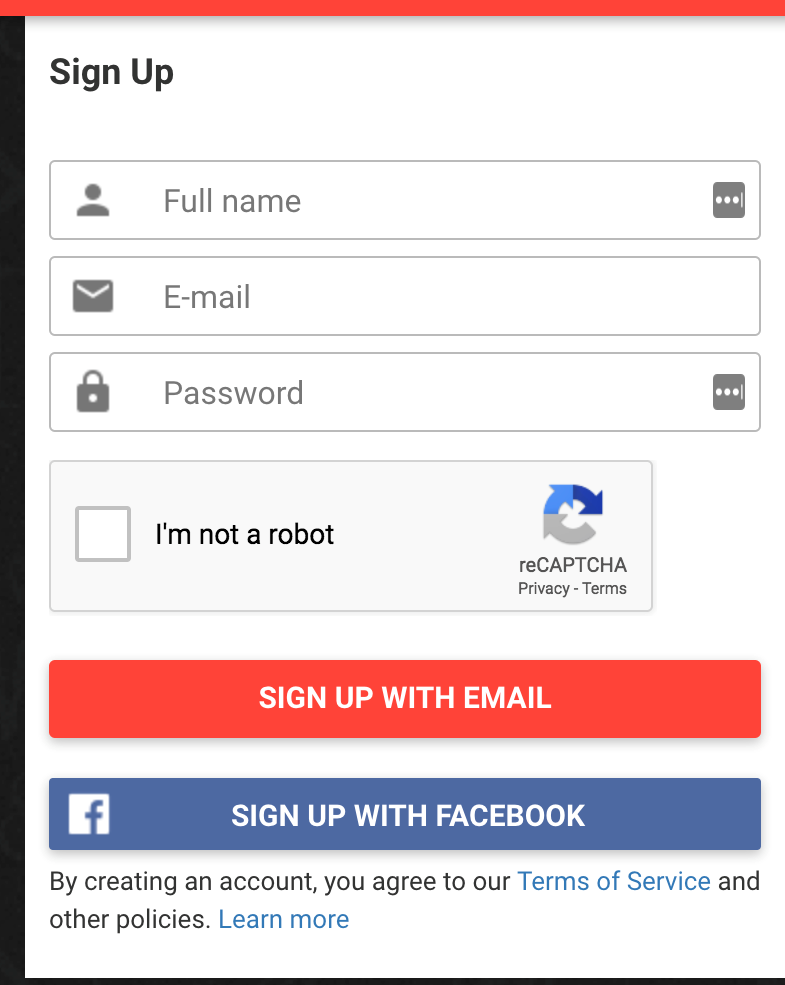
Step 3: Select your native language.
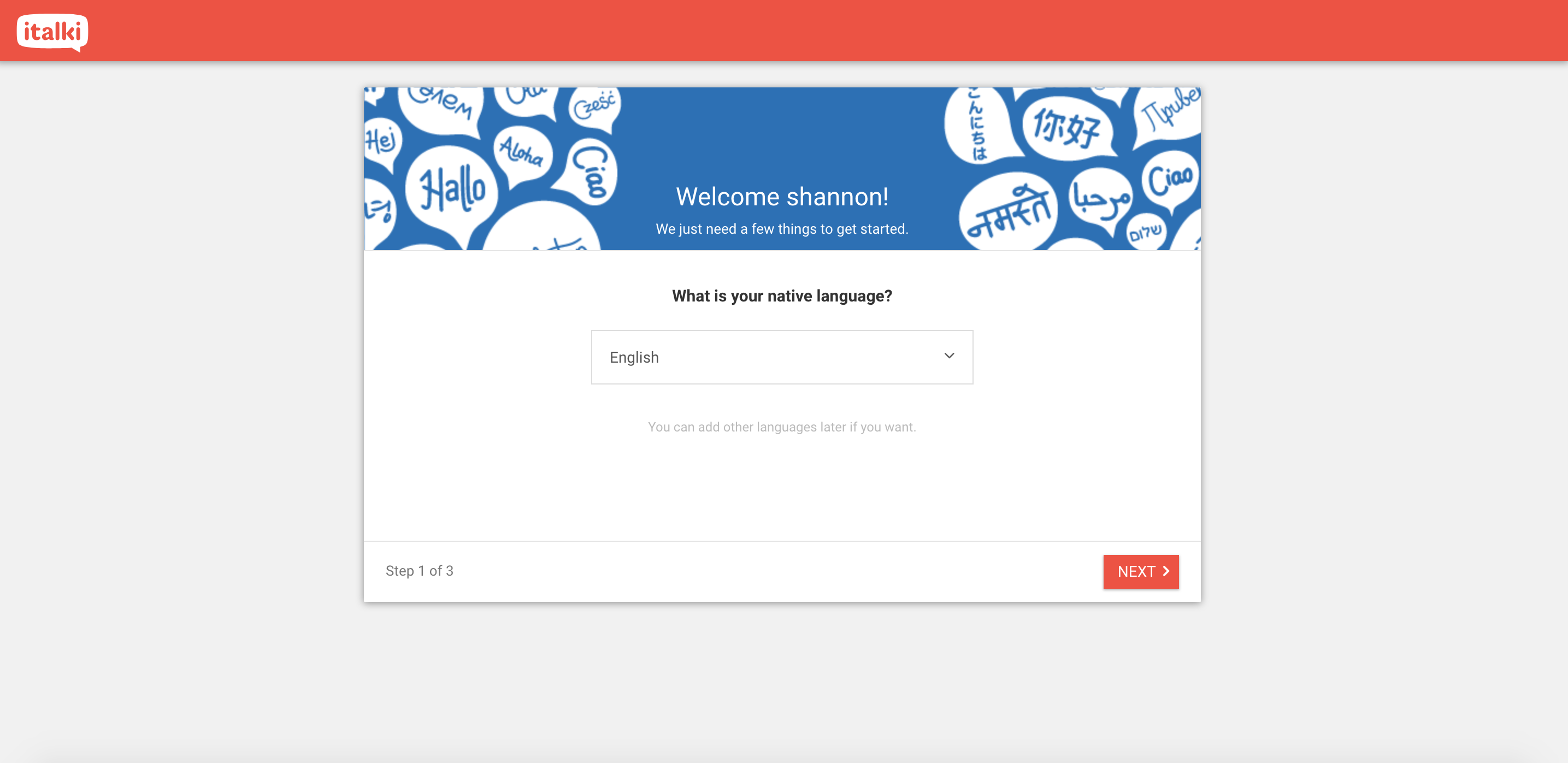
Step 4: Choose your time zone and the country that you live in.
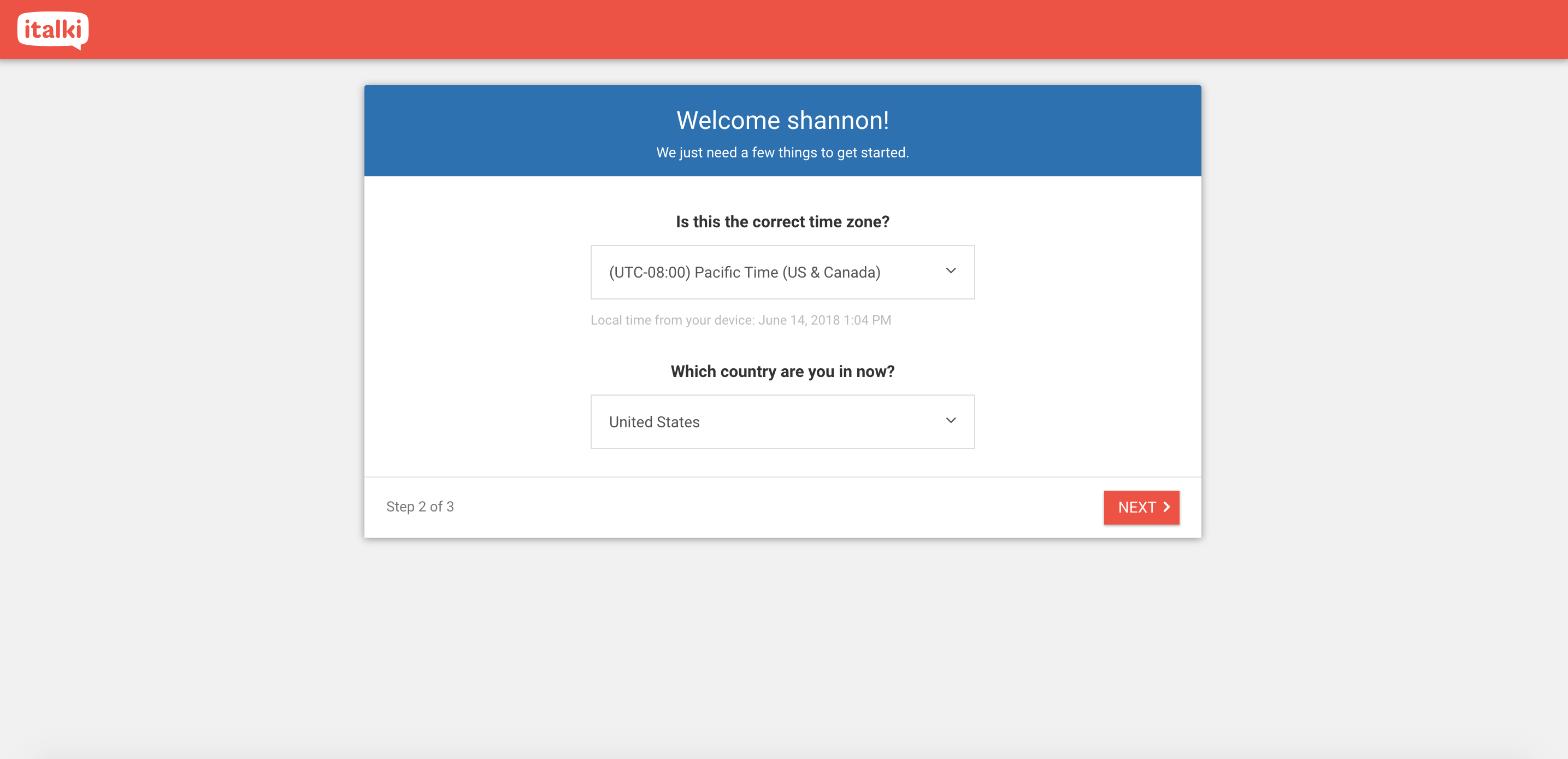
Step 5: Enter the language that you’re learning and your current level (as best as you can estimate it).
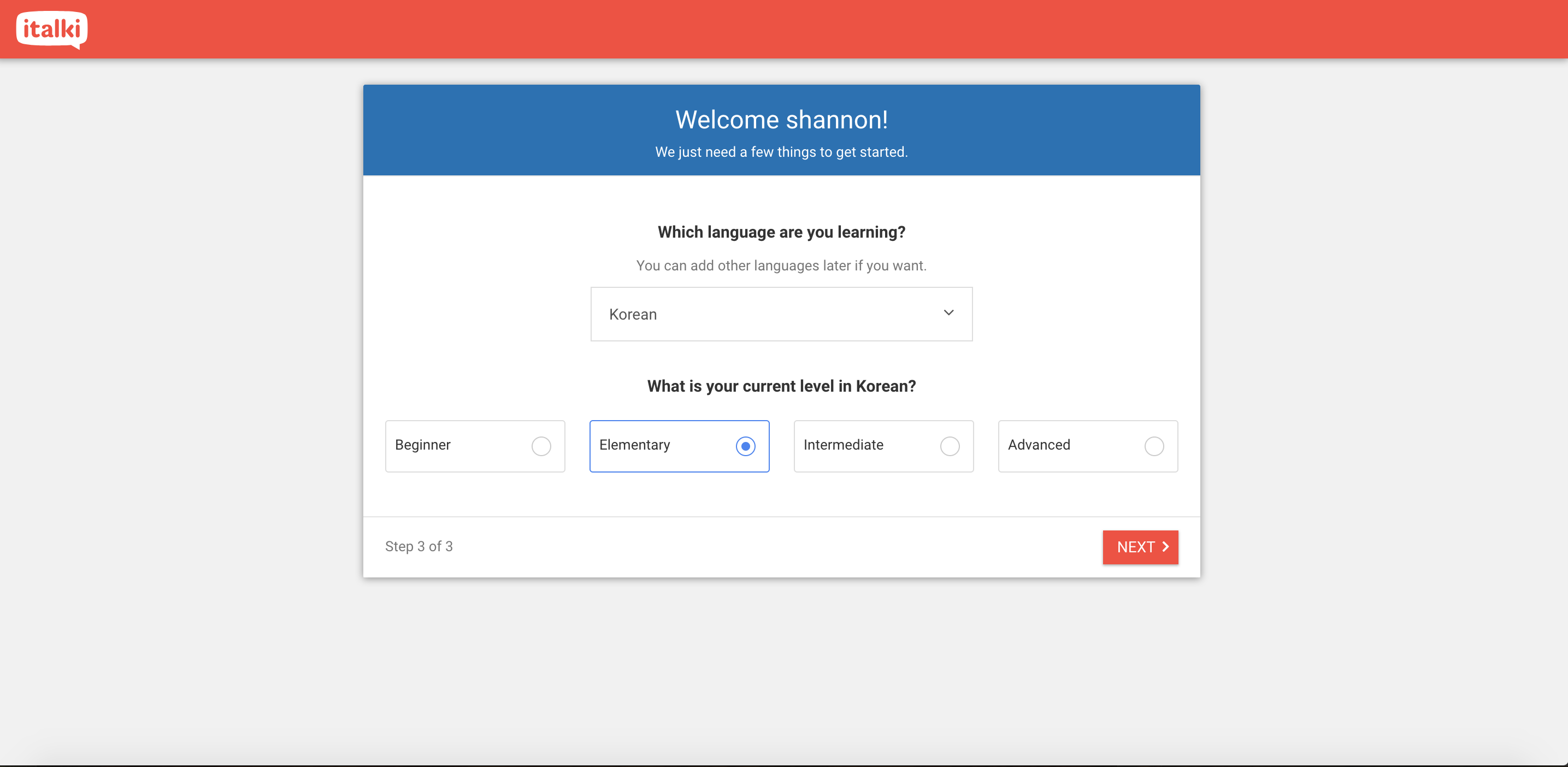
Step 6: Select “I’m not looking for a teacher”. For now, we’ll focus on exchange partners.
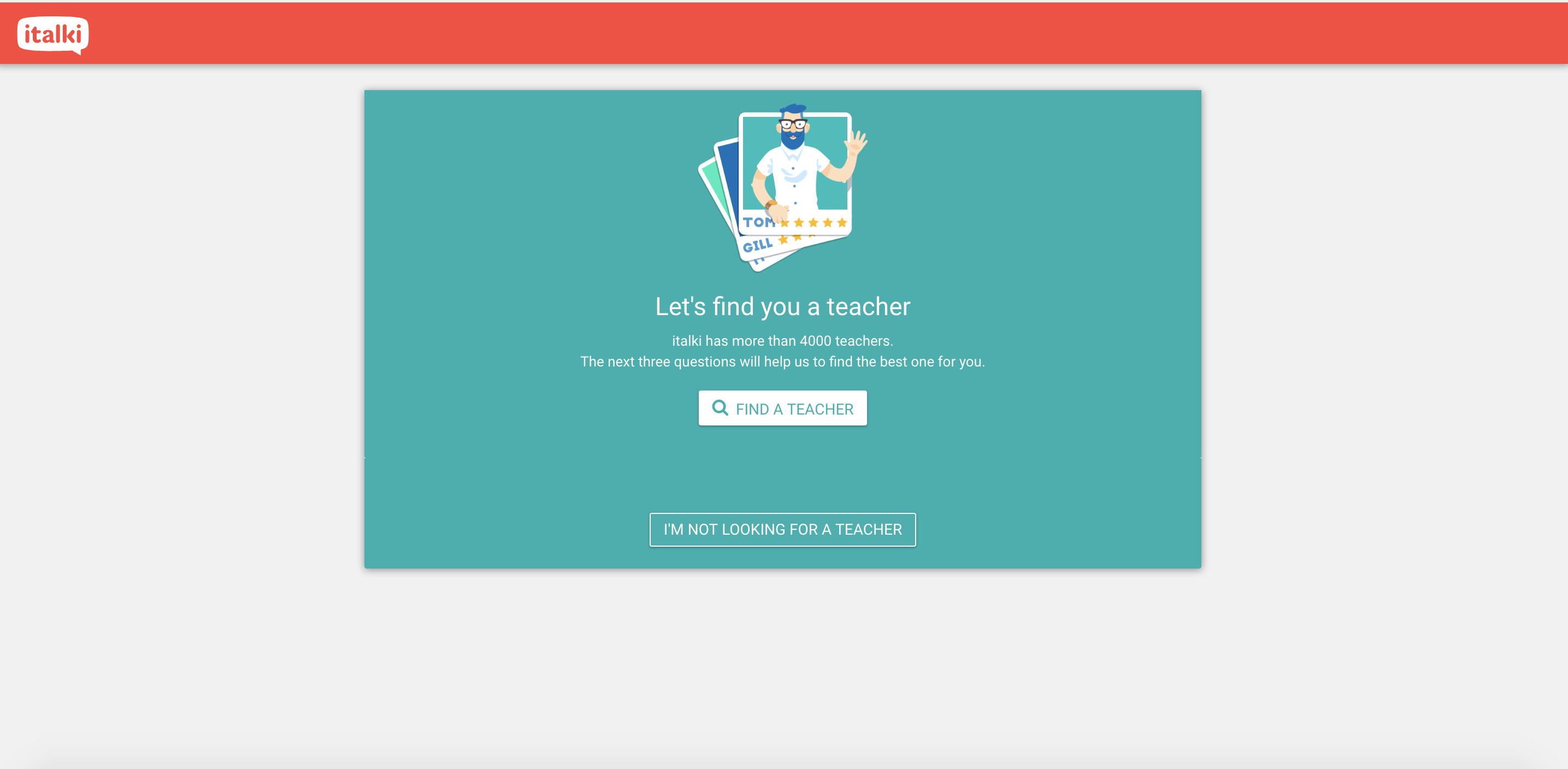
Step 7: Check your email inbox for your confirmation message.
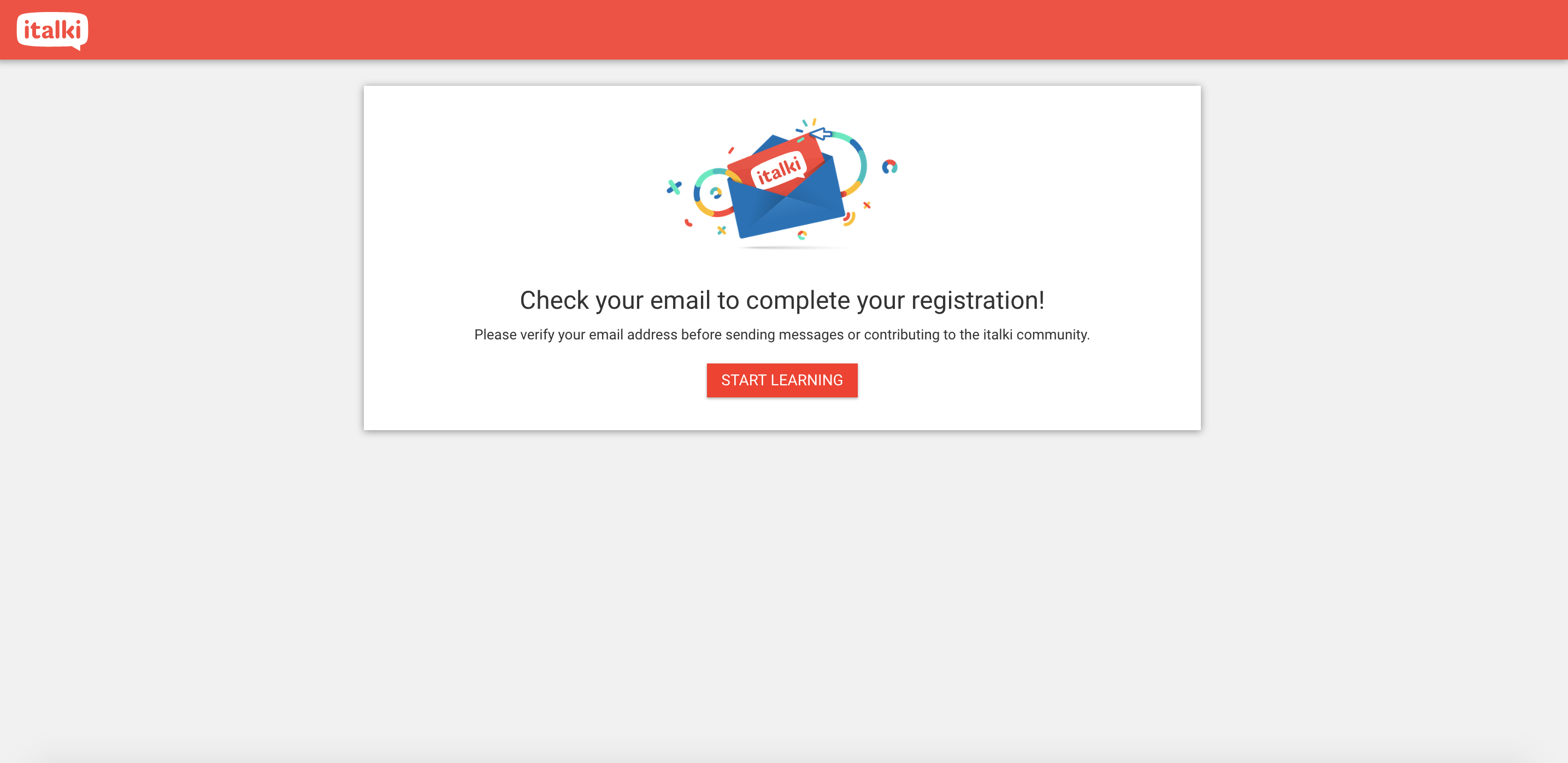
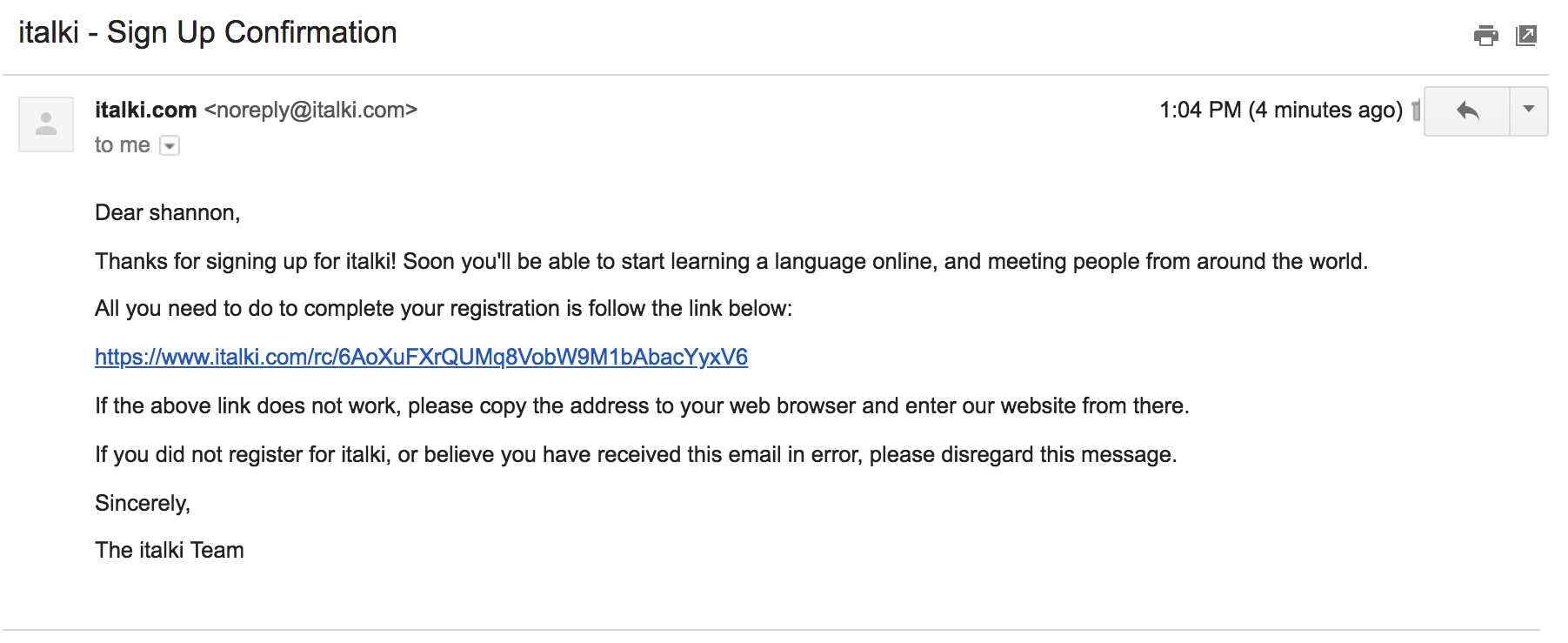
Step 8: Fill out your basic information and upload a profile image. I’ll share more about exactly what to include in your profile later (you can update it at any time).
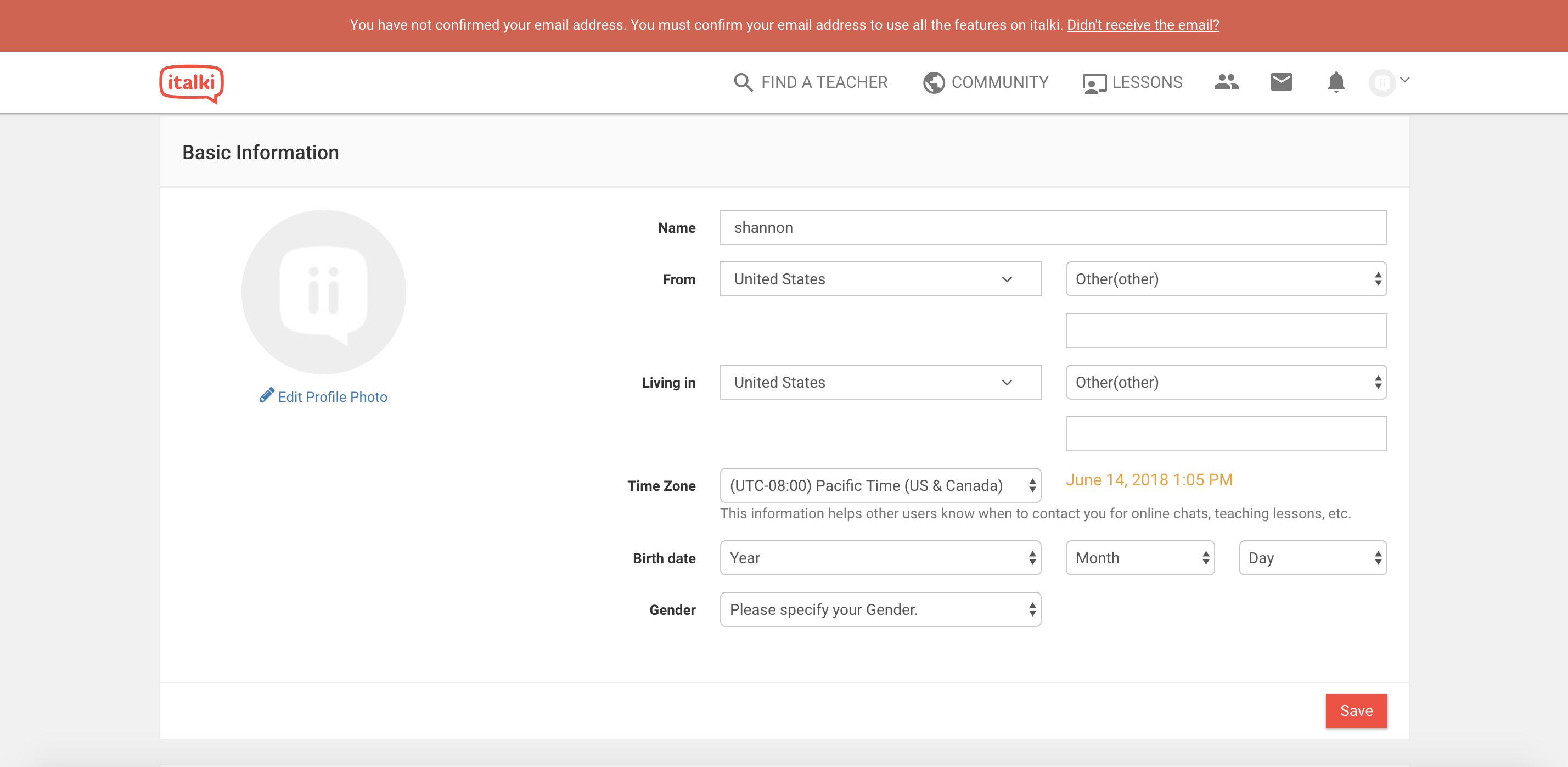
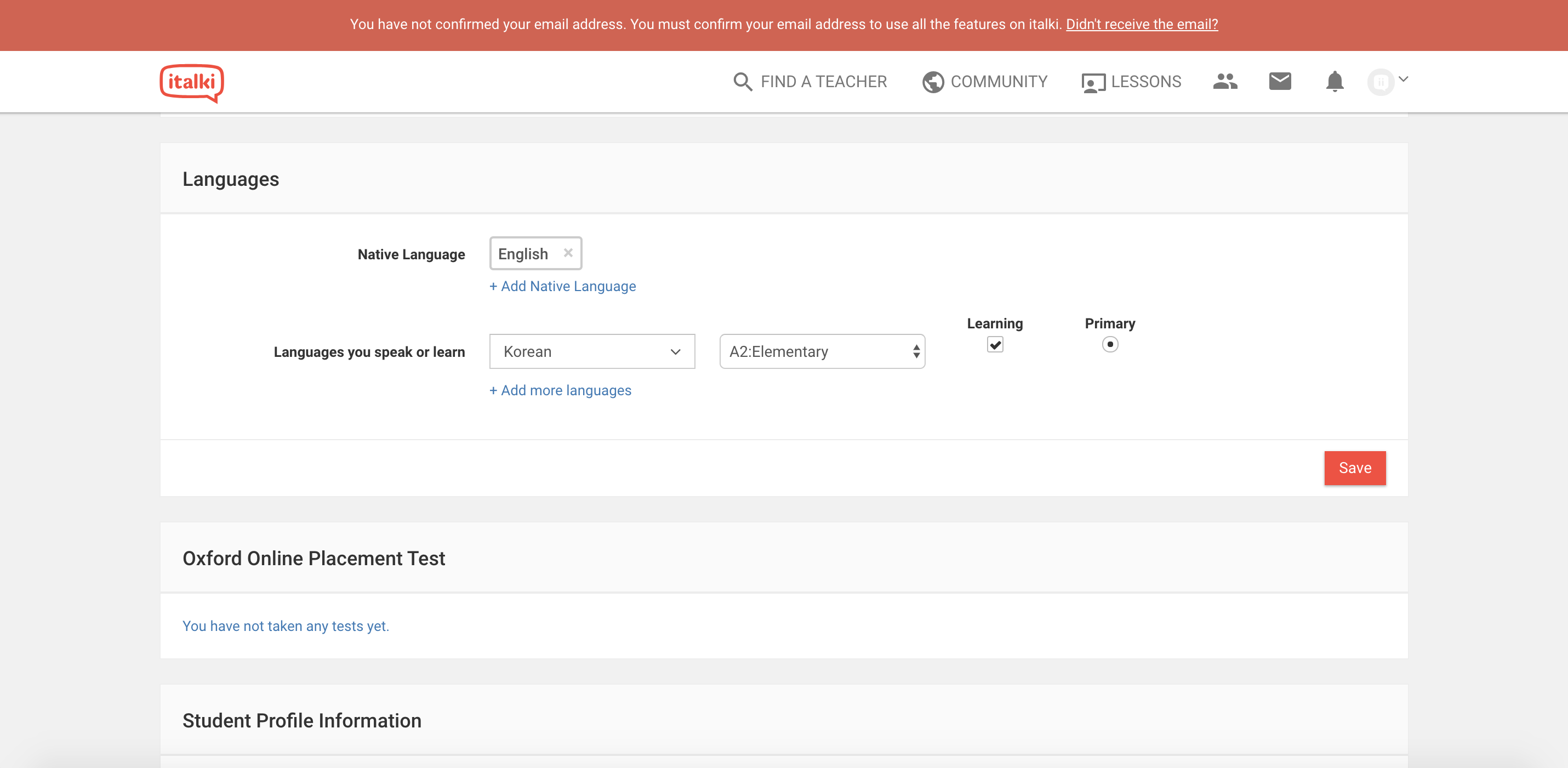
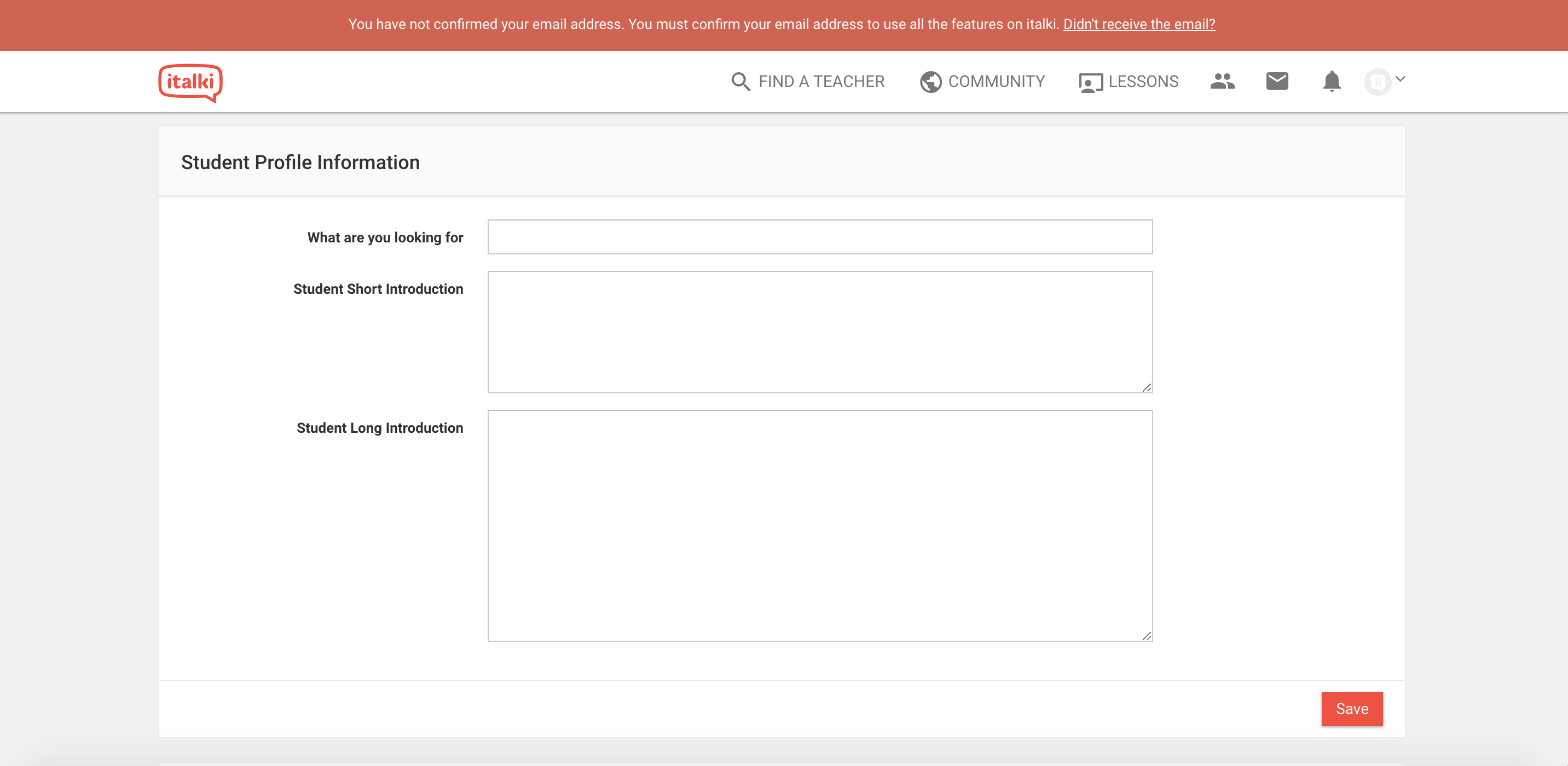
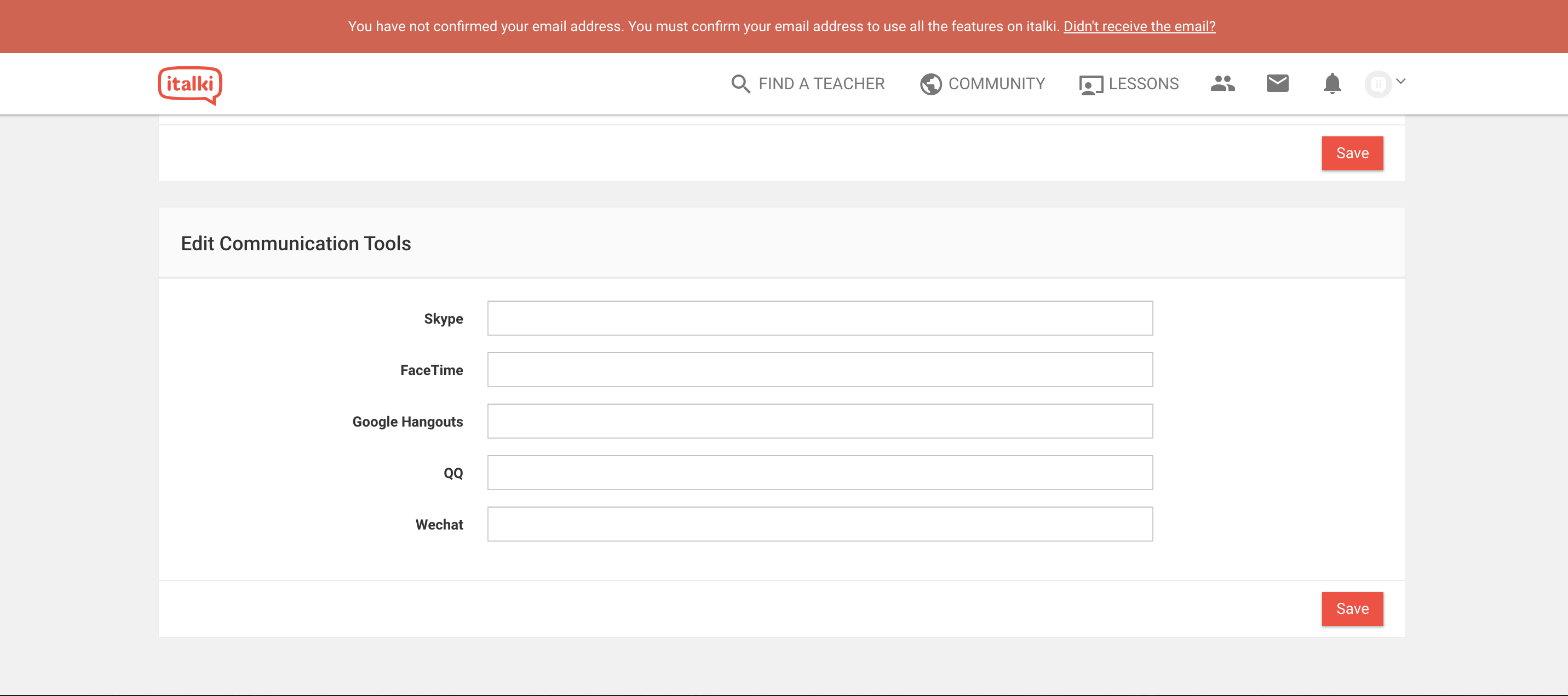
Step 9: Hover over the “Community” tab at the top of the page and click “Language Partners”.
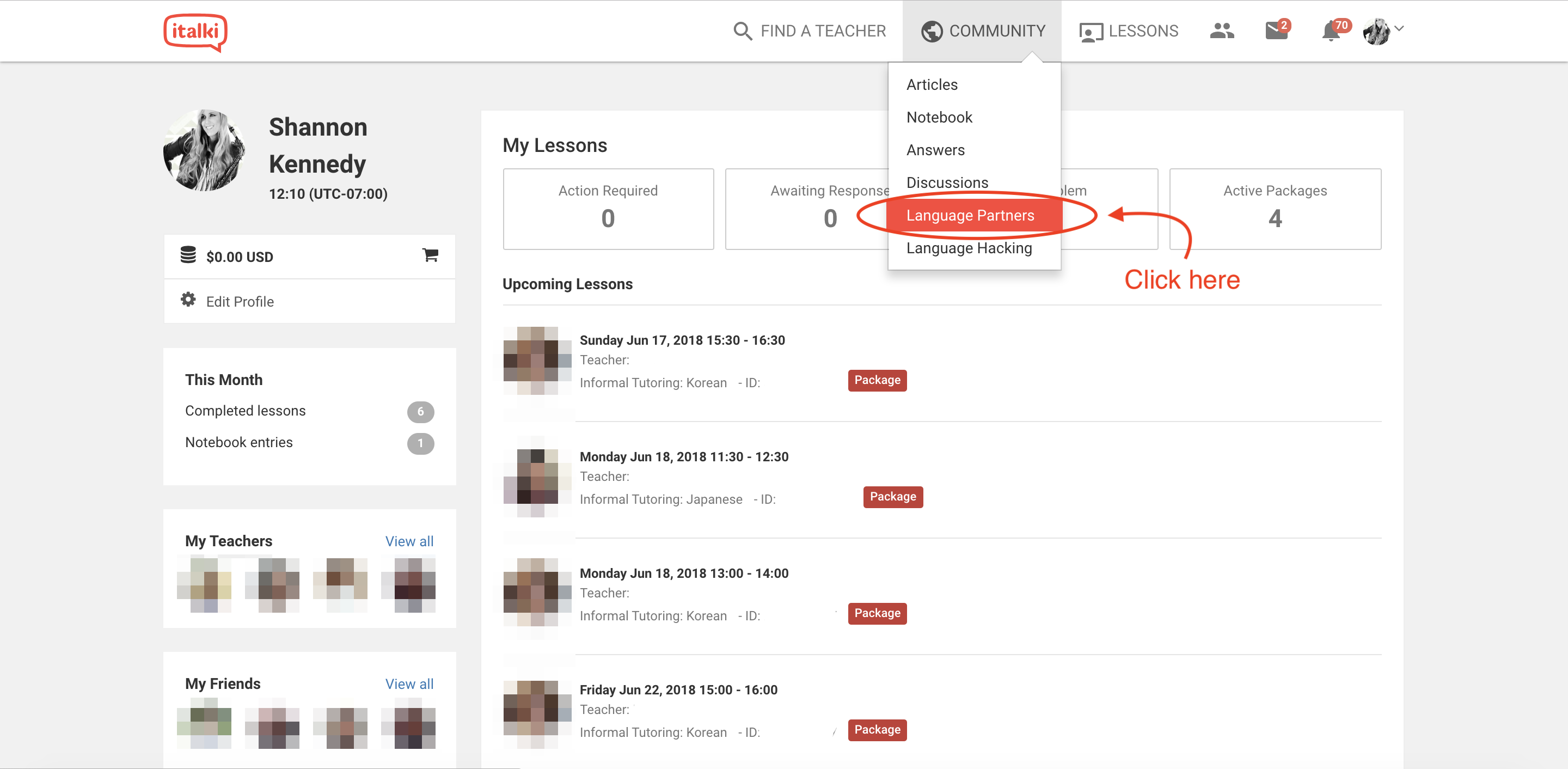
Step 10: Type in your language and click “Browse”. And use the filter options that pop up to add more detail.
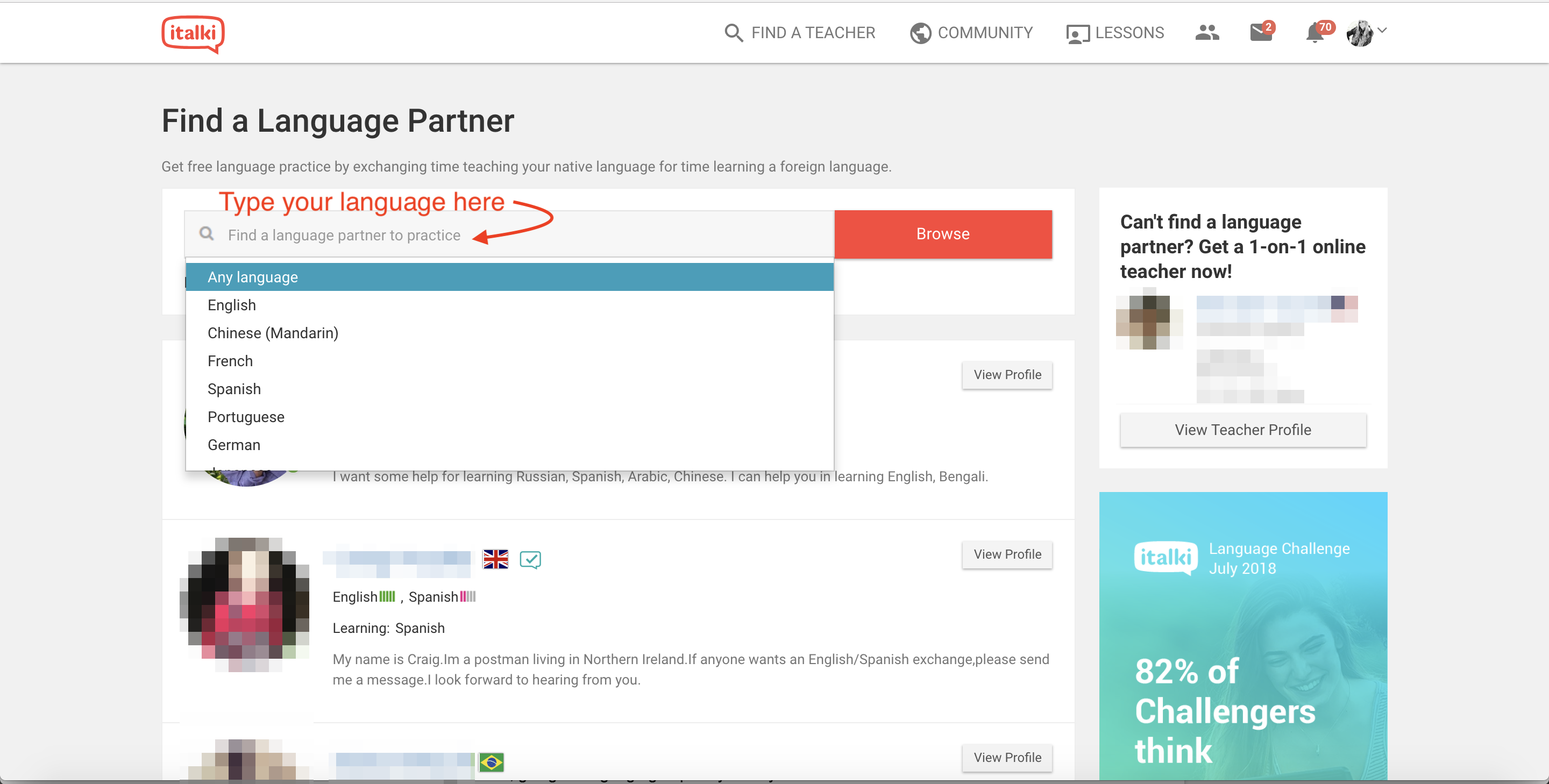
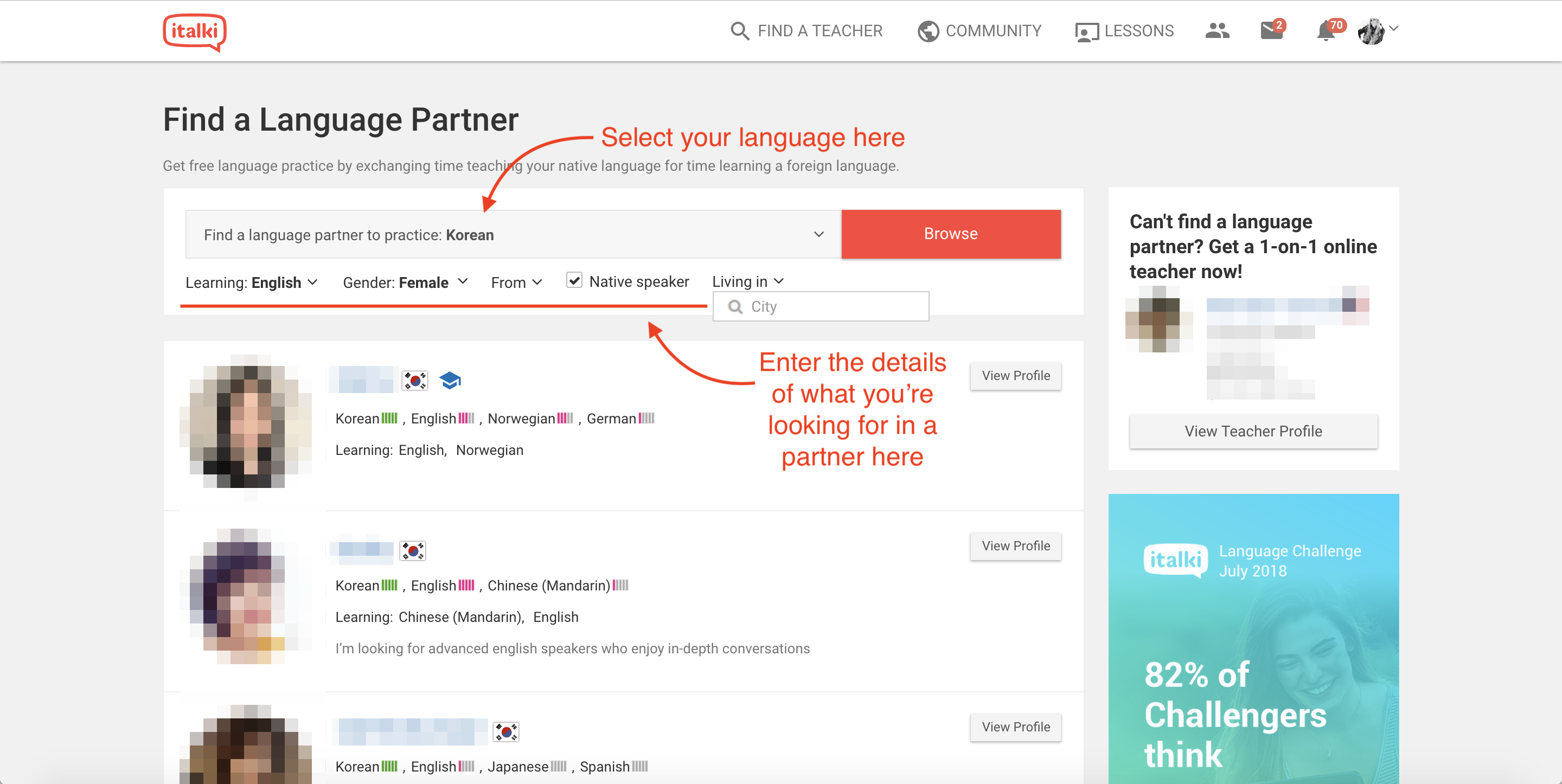
Step 11: Visit their profile and check out their activity statistics.
A few things to look for:
- If they’ve taken lessons, is their rating 5.0 or very close?
- Do they attend all their sessions, or have many disputed sessions or terminated packages? If they’re not able to consistently attend the lessons that they pay for (or are paid to do if they are tutors), they likely won’t be reliable for free exchanges.
- If they have feedback, what does it say?
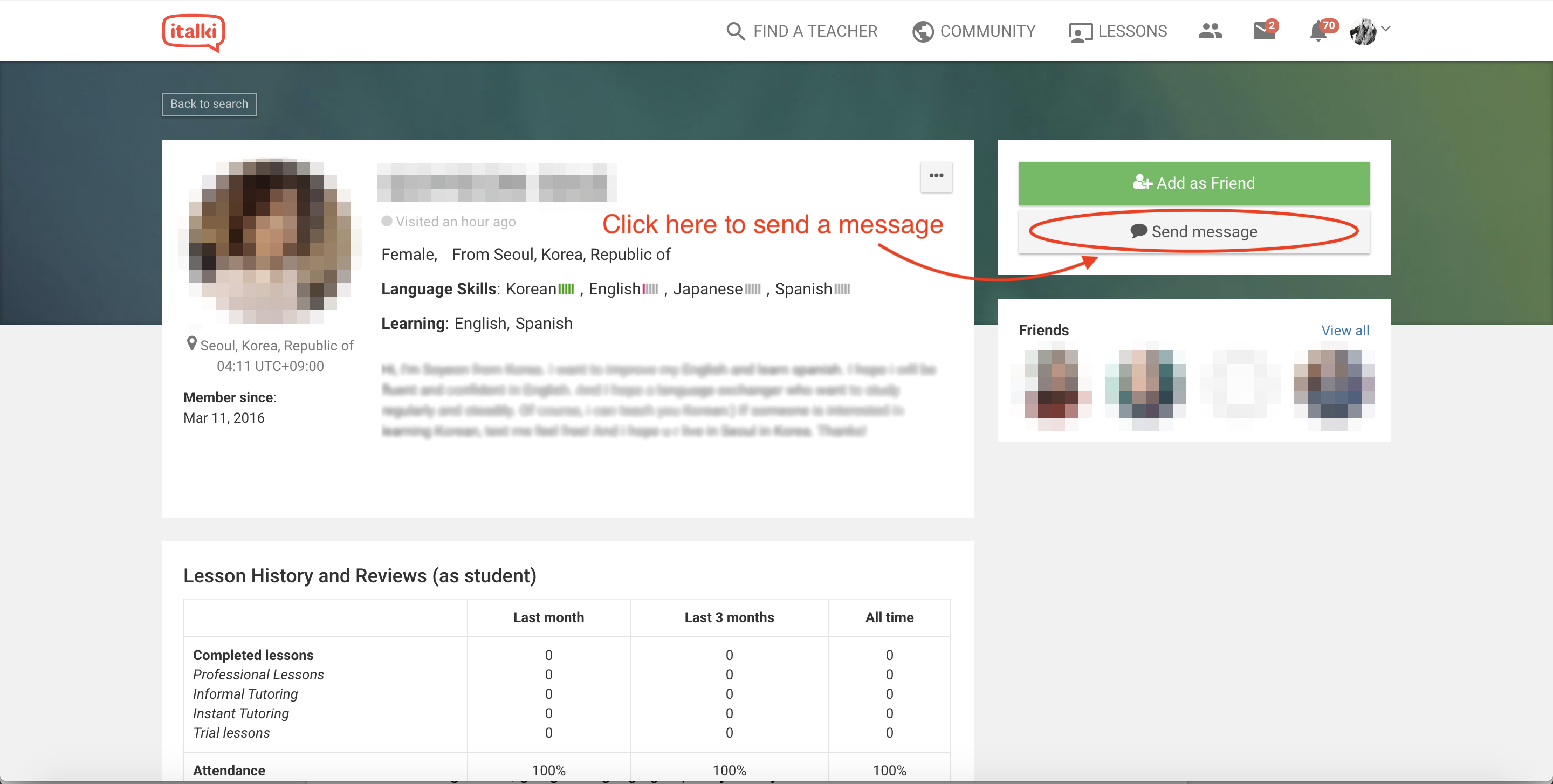
Step 12: Send them a message.
Once you've found a few promising profiles, contact several of them and see if you can get a conversation going with each of them. Until you know you’ve found the right partner, you don’t want to put all of your eggs in one basket.
I’ll show you exactly how to write this message in the next section.
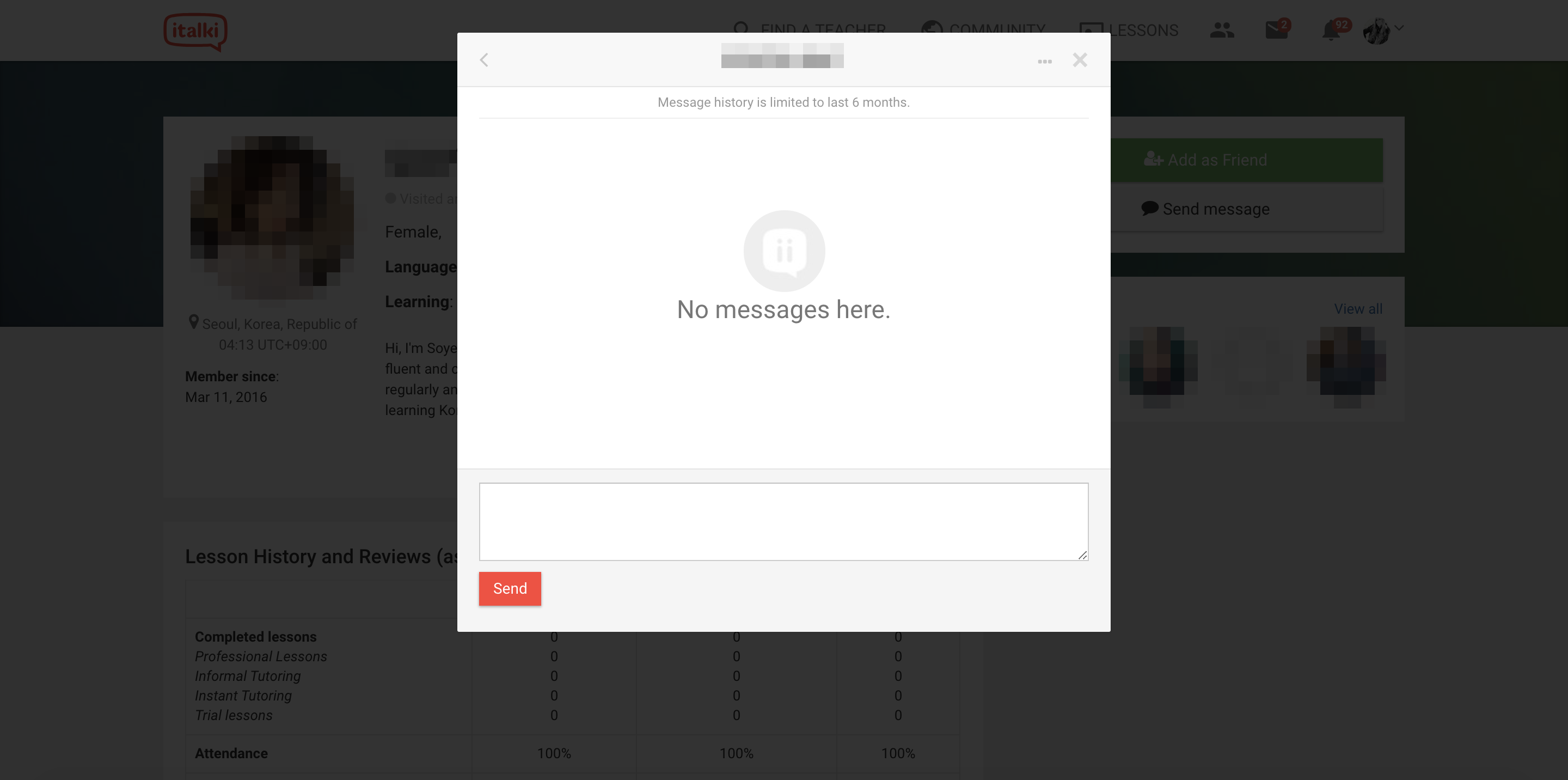
Step 13: When they write back, spend some time getting to know them in the chat before setting up a time for the exchange.
What are Some Good Language Exchange Apps?
If you find that you don’t have time to sit down for a 30 minute to hour long language exchange, but still want the benefits of practicing with an exchange partner, there are several language exchange apps that you can use.
HelloTalk
Our top recommendation is HelloTalk. It’s easy to use and you can filter the results so that you connect with other learners who are exactly the right fit. Plus, you don’t have to jump right into video calls. You can exchange written messages, voice notes, or even just talk over the phone all within the app.
Tandem
Tandem is a language exchange app with more than three million members around the world.
Amikumu
Interested in connecting with language exchange partners in your area? Amikumu will help you do just that. They support more than 7,000 languages and a chat feature.
Other Places to Find Language Exchange Partners
Beyond italki and language exchange apps, there are countless places to find language exchanges partners, both online and out in the real world. Here are just a few of the places used by Fluent in 3 Months team members.
Busuu
Busuu is an online language learning program that also has a community. It is similar to italki in setup, and you can find exchange partners using this feature.
Easy Language Exchange
Easy Language Exchange is a simple to use and free language exchange website. You enter your personal information then are sent to a member directory where you can find your match.
Fi3M Forum
The Fluent in 3 Months (Fi3M) forum is an incredible language learning tool that’s waiting to be used on this very website. Our membership boasts thousands of members, all learning languages, waiting to connect with their perfect language exchange partner.
Meetup
If find an exchange partner in-person is more your cup of tea, Meetup is an excellent resource. You can search for communities who get together to practice your language, and if you live near a city with expats, you’re sure to find groups within driving distance.
Eventbrite
Did you know that the well-known ticketing agency Eventbrite also offers free events that include language exchanges? Just search “language exchange” and you may find an event near you!
Couchsurfing
Fluent in 3 Months founder Benny Lewis is a huge advocate of Couchsurfing. He’s personally used this venue for finding language exchange partners both as a host and as a guest.
Craigslist
You might by surprised, but Craigslist is yet another place that you can find language exchange partners. All you need to do is place an ad sharing what you’re looking for.
Something to keep in mind when meeting with language exchange partners, especially in person, is to be wary of who you choose to talk to and share personal information with. When meeting in person, always do it in a public place where you feel safe.
Now that you know where to find a language exchange partner, let’s talk about how to reach out to them.
Part 2: How to Organize a Language Exchange
You’ve found a language exchange site or app and are ready to get started.
What do you say when you reach out to a potential language exchange partner for the first time? What do you need to do to make a good impression? How can you craft a message to increase the odds that you’ll get a reply? And most importantly, how do you filter through your replies to choose the right partner?
Tip #1: Make Your Profile Engaging
In the earlier section on how to get set up on italki, I walked you through the steps from signup to reaching out to your first potential exchange partner. One of those steps was to fill out your profile, but what information should your profile include? How much detail should you share? What should you add so that you can get more messages from good matches?
When setting up your language exchange profile, it's important to include the right amount of information. Not too little and not too much. Too much information may be overwhelming for an exchange partner while too little may be too vague so you'll end up with more messages from partners who aren't good matches for you at all.
Here's what you should include in your profile:
- Your name – your first and last, but even just a last initial will do
- Your location – you're often working across multiple time zones, so adding this information will let your partner know how many hours separate you
- Your native language and any other language you speak at a high level
- The language you're learning
- What you're looking for in a language exchange partner
- A few things that you're interested in. You're likely to bring them up in conversation, and by including them, there's a good chance you'll attract exchange partners who are interested in them, too
Not sure what interests you'd like to share? Here are a few ideas to get you started:
- Your favorite movie/TV series/music/book/food/etc.
- What you like to do in your free time
- An interesting class you took on a subject that you'd love to learn more about
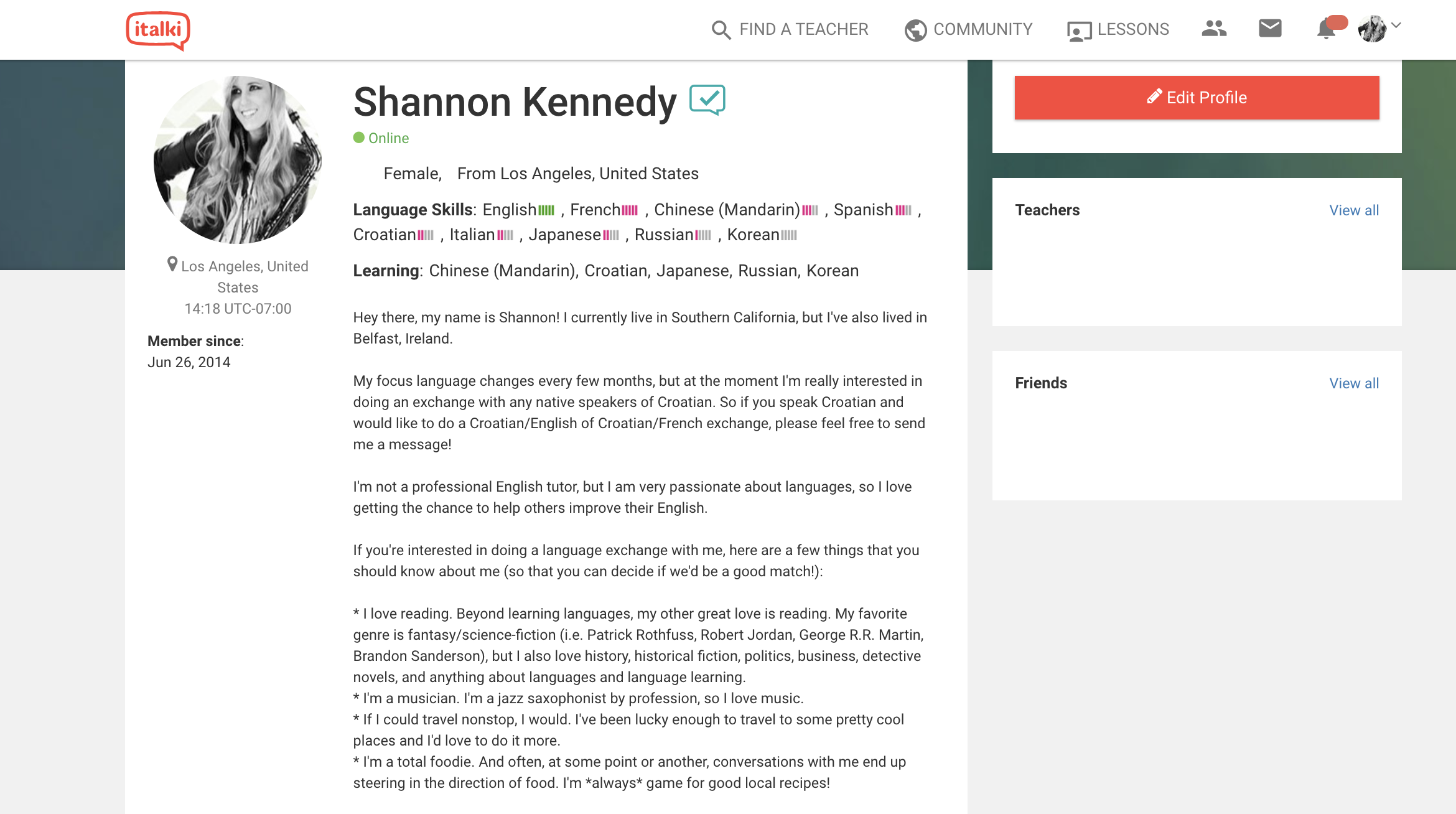
Tip #2: Craft a “Hello” Message that Gets a Reply
Now that your profile is set up to include what your potential partners look for to learn more about you, it's time to get into the best way to make a good impression with your very first message.
An easy way to make a good first impression is by sending them a personalized message. If you're reaching out to multiple partners, don't copy and paste the same generic message to each of them. Instead, spend some time up front doing your homework. Check out their profile and include something in your message to let them know that you've done so. It'll show that you're sincerely interested.
But wait… before you open that new tab, visit your language exchange site and start writing that first message, know that there's a right and wrong to do this.
Here are a few do's and don'ts for writing non-creepy introduction emails.
Don't:
- Only write “hi”, “hey”, or “how ya doin'?” That doesn't give the person you're contacting something to work with and they'll probably just ignore it.
- Lead with a comment about the person's profile picture… unless it's taken somewhere with an obvious landmark. In other words, if you make a comment about the other person's profile photo it should probably be about the cute puppy they’re holding, the fact that you've also been to the Eiffel Tower (which they're standing in front of), or that you think the bridge they're on is gorgeous and you wonder where it is.
- Ask “can you help me?” Rather, you can write things like “how can we work together?” or “let's help each other!”
Do:
- Mention things that you have in common. These might be shared interests, that you've been to the country where they live, or that you both also speak a third language.
- Share what you're offering as a part of the exchange. This might be that you have some experience tutoring, that you're passionate about languages, or that you're a really serious language exchange partner. Let them know what you're bringing to the table.
- Explain that you’re looking for a language exchange partner, and that you’d like to hang out to see if you’re a good fit for each other.
Take a look at the following example messages.
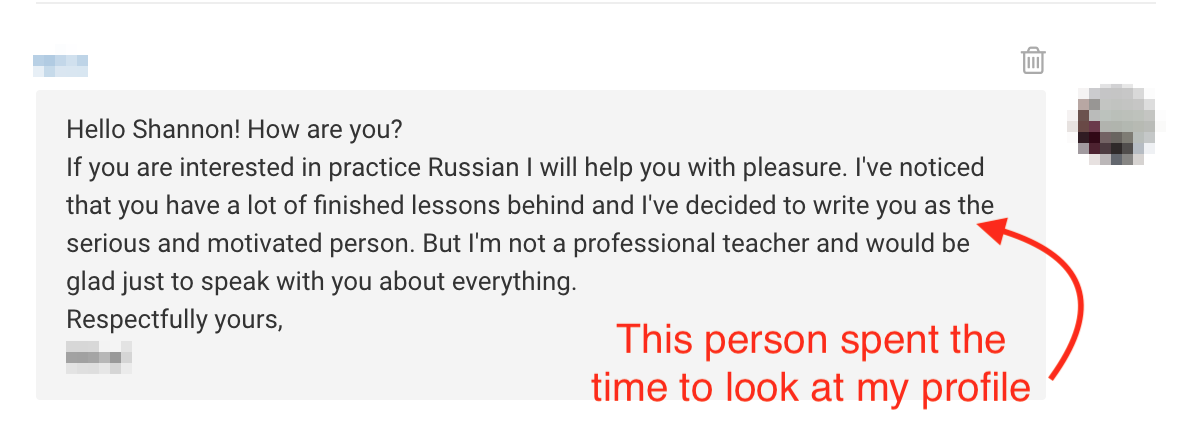



Which stand out to you and would you likely respond to?
Tip #3: Make Sure You’ve Found the Right Partner
How do you know if you've found the right language exchange partner? The best way to do this is to arrange an initial language exchange, and see how you get on.
There are a few signs that the partner you’ve found is a keeper:
For one, your partner will patiently wait for you to finish your sentences and maybe chime in to offer help. They usually won't use your hesitation as an opportunity to divert the conversation back into English (or your native language). Though this may happen briefly if you're really struggling.
They ask questions, take an interest in you, and do their part to keep up the conversation. If you say something like, “I live in California.” They reply with “do you live near the ocean?” rather than with “oh, that's cool… [silence].” They don't make it your responsibility to keep the conversation flowing.
They adjust their register for your level. If you're a total beginner, they slow down when they speak or use simpler words and expressions. They don't insist on talking over your head.
They don't hog the stage. There are exchange partners that tend to take over the exchange and completely forget that it's a two-way street. If your exchange partner isn't giving you equal time, you may need to find a new partner.
Your language skills and levels are compatible. You want a language exchange partner whose language level is compatible with yours. And this doesn't mean that you should both bet at the same level. In fact, if you’re both beginners, you may have a tough time. In the same breath, however, if one person is far more advanced than the other, you may find that the exchange stays in the language of the more advanced person. There's definitely a middle ground. Try to find an exchange partner whose level compliments your own so that you’re both fairly matched.
Finally, it's important to remember the “good exchange partner criteria” aren't just for your potential partner. You need to make an effort to do the above, too!
It’s easy to write off a language exchange, claiming it’s the other person’s fault that it didn’t work out. But this isn’t always the case. Sometimes you need to start with “the man in the mirror”.
Tip #4: Make Sure You’re a Good Language Exchange Partner
An effective language exchange isn’t just about your partner — it’s about you too. Here are some ways you can make sure that you’re doing your bit.
Plan Out Conversation Topics in Advance
One of the easiest ways to waste a language exchange is by showing up without planning ahead.
Plan out conversation topics in advance, check with your partner to see what they think and if they agree on the topics, study and prepare phrases or questions that align with the topic in advance.
If you're feeling stuck, you could even consider writing a script to read in full or use as a prompt during the actual exchange.
Be Committed
Once you’ve found a solid language exchange partner, commit to them. Commit to being on time, to preparing, and to staying focused. Not only will your partner get more out of your time together, but you will, too.
Give People a Second Chance
Sometimes the first session won’t go the way you planned. It happens. If you feel like the first exchange had a few false starts, but that your exchange partner had potential, give them another chance.
Be Up Front About What You Want From the Language Exchange
When you’re looking to regularly connect with someone for a language exchange, it’s important to be clear about what you’re expecting up front. Here are a few things you should consider sharing with your tandem partners:
- Are you at the level where you can keep your half of the exchange entirely in your new language or will you need to revert back to your language at times to work things out?
- How much time can you commit to your exchanges per session? Per week?
- How would you like corrections and feedback? Do you want every mistake pointed out, or just the ones you make repeatedly? Do you want your corrections in real time or once you've finished speaking?
If you don't know what you're looking for, spend time thinking about it. You won't get what you want unless you know what that is. Once you decide what you're looking for, let your exchange partner know what that is. If they don’t agree, then they aren’t the right partner for you.
Ask Them What They Need
Ask your exchange partner what they're looking for by doing an exchange with you. Don't assume they'll want feedback the same way you do or that they'll want to use their time the same way. Once they share what they're hoping for with you, do your best to fulfill those expectations each time you meet. And if you’re not able to, be honest and let them know.
Send a Follow-Up Note after Every Conversation
A day or two after each exchange, follow up with a message to your partner to thank them for their time and ask any questions you have. You can also offer feedback. And if you want to meet them again, have a date and time ready to suggest.
Didn't click with your language exchange partner? No sweat.
Not every match is a match made in heaven. There may be a variety of reasons you and your exchange partner aren’t a good fit.
Trying to force an exchange that just isn’t working isn't worth it. It’s a waste of time for both you and your partner. Your time is better spent finding someone you click with.
Tip #5: Move Text Conversations to Voice Chat
Once you've had the chance to get to know your potential new language exchange partner via chat and have decided that it's time to speak in real time, it's time to take the conversation elsewhere.
If your partner doesn’t take initiative and suggest moving the conversation from text to voice, it can be intimidating to be the one to suggest it. Particularly because talking via chat feels so much more comfortable. Not only do you have time to think about how you’d like to reply in your language, but you can also quickly run it through Google Translate to make sure it’s relatively error free.
When you chat in real time on video or voice-calling, it can seem like that safety net gets pulled out from under you.
One of the biggest fears many learners have when it comes to speaking their language is that of making mistakes and getting laughed at for it. But that’s one of the best things about a language exchange partner. They’re also learners, so they can relate to how you’re feeling and they certainly won’t laugh. They know how much courage it takes for you to try, so even when you make mistakes, they’re there to support you and offer corrections (if you want them), not judge you for them.
After spending some time with your partner via text chat, getting to know them and making sure you’d be comfortable speaking with them, all you need to do is send them a quick message. Here’s an example:
“Hey [name], I’ve really enjoyed chatting with you and I think we’d make great exchange partners. Would you be interested in meeting on Skype/Facetime/etc so that we can practice speaking?”
It’s as simple as that.
Now, let’s get to that Skype/Facetime/etc part…
Part 3: The Day of the Exchange is Here. What Now?
You’ve made the suggestion to speak, so where do you take it?
You have a few different options, so let's talk about what they are.
The Tech
Today, thanks to our smartphones and computers with built-in cameras, jumping on a video call with an exchange partner is easier than ever. And there are a lot of different free and convenient ways to do it. Let’s look at a few of the different options.
But First… Here’s the Equipment You Need
To do an online language exchange here's what you need:
- A smartphone
Or…
- A computer with an internet connection
- A webcam (if your computer doesn't have one built-in)
- A microphone (again, if your computer doesn't have one built-in)
- Headphones (not mandatory, but they will help you better hear the other person and tune everything else out
Despite the fact you need more equipment to make an exchange work on your computer, I highly recommend using a computer over your smartphone for a couple reasons.
First, with a computer, you can have a browser running in the background with tabs open for a dictionary, a translator, relevant word lists, and your script. Second, you can also have a blank document open within which you can take notes so they're easy to copy and paste into your Anki flashcards later. On your computer, it's easy to open the other windows as your exchange happens. On a phone, however, depending on which application you're using, you may pause the call. Either way, it's much easier to navigate through multiple applications and windows.
Now let’s take a look at some of the apps you can use for your language exchange.
Skype
Skype is by far one of the most popular video calling tools used by language learners. It’s free to sign up and use. Download Skype.
Google Hangouts
If you have an account with Google, you already have Hangouts. It's their free chat application, but it also does video calls. The best part about using Google Hangouts is that you can easily record your chats using YouTube Live so that you can watch them again later to pick up on anything that you missed. Signup for Google Hangouts. Note that it can take up to 48 hours to get approved for a YouTube Live account.
Facetime
Apple computers and smartphones come with Facetime, an app that allows you to make free video calls to another Apple user.
Google Duo
Google Duo is the Android equivalent of Facetime, or close to it. It works for one on one calls and most Android devices now come with it pre-installed.
Facebook Messenger
If you have a Facebook account, Facebook Messenger now supports video calling and it works for both one on one calls and group calls. The video quality isn't always the greatest, but it does the job.
WhatsApp is a popular video calling app, especially outside of North America. It's owned by Facebook, but it’s a separate product from Messenger.
In-App
If you're using HelloTalk or Tandem, you can shift the conversation from text to video within the app without the need of any additional installations.
Face-to-face
Finally, if you feel comfortable with your language exchange partner and would like to meet them face-to-face, this is always an option if you're located within traveling distance of one another.
6 Reasons Online Language Exchanges are Better than Face-to-Face Exchanges
While meeting with someone face-to-face may seem like the ideal way to go, there are many advantages that online exchanges have over in-person meetings. For example…
- It's easy to look things up without interrupting the conversation. When chatting with a language exchange partner online, you can take the time you need to ctrl+tab over to your browser to look something up using a translator or dictionary without distracting the conversation. In real life, it might come across as rude if you look down at your phone to do the same thing.
- You can record your exchanges. As I mentioned before, you can record your conversation exchanges when you do them online. In person, however, this may be awkward to suggest and inconvenient to arrange.
- You can share a Google Doc. And in this doc, you can take notes on the exchange and get live corrections from your exchange partner. That way, they can write down your mistakes rather than interrupt you with them.
- You can Screenshare. If you'd like your exchange partner to see something on your screen or vice versa, you can share your screen. In doing this, you can read a book together, watch a video together, among other things.
- Virtual immersion. If your exchange partner is heading out to a local or cultural event, they can bring you along – virtually, of course. As long as you or your partner have good wifi signal, you can share different experiences that are relevant to your language and its culture.
- Be heard, not seen. In-person, you have no choice but to be seen. But when you do an online exchange, you can turn your camera off. If you're shy, having a bad hair day, or don't want anyone to see that you need to do some picking up around the house, this is a choice you can make.
Making Sure Everything Works
Before you have your first online language exchange, it's important to make sure that everything's working. It’s a good idea to test your mic and audio settings so that you can hear and be heard. Knowing everything is working is a good confidence boost.
The First Conversation
It’s natural to be nervous during your first language exchange. Or even with your first language exchange with a new person even if you’ve done other exchanges before.
One of the biggest reasons most language learners avoid language exchanges is because they don’t feel confident they’ll do well. But the only way to get better at conversing is by doing it. You could see this as “fake it until you make it”.
How do you feign confidence until you're actually confident?
1. When You Make a Mistake, Keep Going!
Avoid the temptation to switch into English (or your native language) and explain your mistake. If you switch back to English, you’ll encourage your exchange partner to do the same. Instead, just keep talking! If you’re really struggling, take the conversation in a new direction.
Your exchange partner might not even have noticed your mistakes.
If you would like your exchange partner to mention mistakes, then it’s best to ask them to take notes and go through them with you at the end of the conversation.
2. Come Prepared!
Don't leave it up to your partner to decide where the conversation goes. Instead, come prepared with questions and potential answers to questions that may be asked of you so that you can steer the conversation. If you take a passive role, you let your partner take control and this may lead you to topics or material you're not prepared for.
The best way of doing this is to agree on a conversation topic with your partner ahead of the language exchange. That way, you’ll have time to prepare.
3. Roleplay
Have you picked out a topic for your next language exchange? Then you can start practicing already! In your head (or on paper), roleplay that conversation. Try to imagine where the conversation might lead and then do your best to prepare for it.
You won't be able to predict everything that comes up when you chat. But you will feel much more prepared, and you’ll be surprised at how much of the roleplay you use.
4. Take Notes
It goes without saying that you won't understand everything that your language exchange partner says to you during your exchange. When that happens, the first step is to ask for clarification. Once you get it, take notes! That way, you won't be caught off guard in the future.
5. Avoid Asking “Why?”
When I come across something that's unfamiliar, my knee-jerk reaction is to ask “why?” Why does this grammar structure do this? Why does that word mean these two seemingly opposing ideas? Why?
But when you're doing your exchanges, it's important to leave “why” questions out. Your exchange partner isn’t a teacher, so they may not have an answer, and even if they do, they may not be able to explain it in the best way.
“Why?” can be a tough question to avoid, but for now, your time is best spent if you:
- Ask for the grammatically correct version of what you're trying to say,
- Write it down, and
- Look up “why” later on your own.
You don't need to write down every word or phrase you don't understand. Just those you think are personally relevant or likely to come up again.
How to Get the Conversation Started
Preparing topics for your language exchanges is always a good idea and that's no different for your first exchange. The good thing is, your first exchange already has a topic. You just need to prepare for it.
A good message to send your exchange partner beforehand is:
“I know we've already gotten to know one another a bit via chat, but for our first exchange, let's share our self-introductions.”
A self-introduction is where you introduce yourself and then follow up with questions for the other person. A few things you might include are:
- My name is…
- I'm from…/I live in…
- In my family, there are…
- I work as…
- My hobbies are…
There's no better way to get a conversation rolling than by asking:
- So, tell me a bit about yourself
- What do you think about…
How to Keep the Conversation Going
There have been times when I’ve been in a language exchange, and I’ve been so worried about understanding and answering the questions the right way, that I did a poor job of keeping the conversation going.
I’ve now found a simple trick you can use in 95% of conversations.
So what’s the trick?
Remembering to say: “and you?”
Here are a few more suggestions on how to keep the conversation going. Learn how to say these in your language:
- Tell me about your week(end)
- What are your plans for tonight/the weekend?
- Please say that a few times over for me to listen to
- Let's repeat the conversation so I can practice the new words
The Most Important Thing to do Before You Hang Up
The most important thing you need to do before you hang up is:
Plan the time for your next call and put it on your calendar.
It's easy to think that this is something you can do after the call is over, but when you wait until later, there's a good chance that next exchange might not happen at all.
You or your partner may forget to reach out and schedule the next exchange. Something may come up and you lose touch. Your partner forgot their password and no longer has access to the platform where you were exchanging messages. It happens.
But you can avoid letting it happen to you by getting your next exchange on the calendar before you hang up.
Part 4: Scripting: the Secret to Success
Now that your first conversation is done and you’ve gotten the most obvious conversation topic out of the way, what’s next?
Do you just keep showing up to chat about whatever is on your mind that day?
No. At least, not if you really want to get the maximum benefit from doing these exchanges. Instead, it’s time to turn to one of our favorite conversation hacks at Fluent in 3 Months – scripting.
What is Scripting?
Scripting is the best way I know to make conversations go smoothly. With a script, you prepare what you’re going to say ahead of a language exchange, and you write it down.
How much you write down is up to you.
Some learners like to create a script they can read read word-for-word. For others, it's a checklist of words or phrases they've written down that they can fall back on if they're not sure what to say. And for others yet, it's a collection of new material they'd like to use in the conversation they're having.
I've used some version of all of the above in my language exchanges. At first, they tend to be something I read from directly, then as I get more confident in my ability to use the language on my own, it becomes a checklist of words or phrases I'd like to try out in my exchanges to either a) find out if what I've written down is correct or b) give that material a new context so that it sticks in my memory.
How to Prepare a Script
Now that you know what scripting is, how do you prepare your script?
The first step is to decide what you're going to talk about in your next language exchange. Once you and your partner agree on a topic, you can begin looking up words that are unfamiliar, putting together phrases that are useful, and even just figure out what you want to say.
My process for creating a script usually looks like this:
Step 1: Decide What You Want to Say — in English
Before I even throw my new language into the mix, one of the first things I do when putting together my script is decide what I want to say in my native language.
I may write a short paragraph, a few phrases, or even just a few keywords. It's at this stage when I'll roleplay the conversation on my own to try to predict where it might lead so that I can be as prepared as possible when it finally rolls around.
Step 2: Translate Your Script into Your Target Language
Once I know what I'd like my script to include, I set to work translating whatever I've written down into the language that I'm learning. I try to do this on my own with a dictionary first, and only if I'm totally lost, I'll revert to something like Google Translate.
Step 3: Check Your Work.
After I have everything translated, I want my work checked. That way, if I make a mistake during my exchange it's contextual, not grammatical. What do I mean by this?
When I had my first ever Mandarin Chinese exchange, I had a list of words and phrases that I had learned from a TV series I watched. My goal during that exchange was to use as many of those phrases as possible. I wrote them down into a script, and before the exchange, I had asked for help to check my script was correct.
On the day of the exchange, I was doing pretty well until we got to the end of the conversation.
I had written down a phrase (that I've now forgotten because it wasn't relevant to me) for saying goodbye. But even though the phrase was right, the context was wrong. It was something a shopkeeper or business owner might say when a customer is leaving their store. It wasn't something someone might say when ending a conversation with a friend.
My exchange partner quickly corrected my mistake and it proved to be a good learning experience. But most importantly, I had the right phrase for the next time.
Example Script
Here are two example scripts that I might use. The first is a word-for-word script that I might memorize but keep on hand during my exchange in case I forget what I want to say or get stuck. In it, I talk about my experience going to a local Croatian restaurant. The second is what I call my “Checklist Script”. It's a list of words or phrases that I want to try to use in an upcoming exchange. It's on the same topic so you can see how the two differ.
Script 1: Word-for-Word Script
Last weekend, I went to a really good restaurant. They served Croatian food. I was able to practice speaking the language with our waitress. It was a great opportunity! The food was delicious. I ordered ćevapi and then, to drink, I had a Turkish coffee. They brought it to me with a piece of Turkish delight. It was my first time having Turkish coffee and I liked it. It wasn't too strong. Maybe that's because I often drink espresso. In the restaurant, there was also a small grocery. They sold food, tea, coffee, and candy from Croatia. Of course, I bought a lot of different things to try. For example, tea cookies, Croatian chocolate, and spicy ajvar. Do you like spicy food?
Script 2: Checklist Script
Time Words and Connectors:
- Last weekend
- Often
- First time
- And then
- For example
- Of course
New Vocabulary
- Small grocery
- Waitress
- Delicious
- Turkish coffee
- Tea cookies
- Candy
- Spicy
Phrases:
- It wasn't too strong.
- Do you like spicy food?
- It was a great opportunity!
You can see in this second script, that all of the words and phrases listed also appear in the first list. Using the Checklist Script is my preferred way to do exchanges because:
- I look at my exchange partner more often than I look at my script
- I get to practice putting the rest of it together on my own (rather than doing this once to write my initial script)
- I can bounce around more easily and naturally in the conversation because I'm not attached to saying certain things in a certain order
Now that you know how to prepare your script, let's talk about some of the topics you may want to create scripts for.
Part 5: Conversation Exchange Topics
“How to Improve Your Language Quickly” by Boris Shekhtman is a famous language book that’s all about scripting. In it, he describes language islands — and they’re really useful for language learners.
What is a Language Island?
So what is a language island? They are “small, but very well memorized, much practiced, and frequently used monologue[s].” In other words, scripts.
Islands can be built on any topic, but there are a few key criteria to consider in order to make these islands good safe harbors for you.
An island should be built on a topic that:
- You find interesting. If you think something is interesting, you're more likely to remember the words, facts, and phrases that surround it.
- You'd normally discuss in your native language. If you don't know the words in your native language, it will be hard to figure out what the right words are in your new language.
Islands can be either personal or general, but not too general. Otherwise, you can't get into deep conversations.
So what might make a good language island?
- A particular period or place in history. For example, I love medieval history, both for the sites I visit when I travel and for the fantasy worlds built around it. It would be a great topic for me build an island around.
- A hobby. Do you love martial arts, cooking, or origami? Hobbies make excellent language islands because they're something you're passionate about.
- Your work. If you love your job, this is another island you can swim to.
- Your family and friends.
- A TV show or book you really enjoy.
- Politics or causes. If you're passionate about politics or a specific cause, these are also islands you can build.
- Music. If you like a particular genre, band, or music scene, this is something that you can talk about with great interest.
A MOUNTAIN of Ideas for Conversation Exchange Topics
Not enough to get you started? Here is a MOUNTAIN of ideas for conversation exchange topics:
- Ancient history
- Modern history
- Current events
- Martial arts
- Your pets
- Your family
- The last big project you worked on at your job
- Something you're planning to do in the near future that you're really excited about
- Something that you'd one day love to do but haven't yet had the chance to do
- The weather – what weather do you most enjoy? What weather do you absolutely hate?
- Something you're afraid of
- Your favorite food
- Exchange local recipes
- Make up a story with someone as a part of a conversation
- Talk about the last really good movie you saw
- Discuss space exploration
- Football (soccer in the US)
- Something you collect – why you started to collect it and how you acquired some of the most hard-to-find pieces in your collection
- A class you took
- Something you saw in the news that you found interesting
- Celebrity gossip
- Something one of your friends did that really impressed you
- How you de-stress
- Coffee or tea?
- Who is your favorite actor/actress/singer/comedian/musician/band
- What you did the previous weekend
- What your plans are for the upcoming weekend
- What's considered rude/polite in different cultures
- A popular trend that annoys you
- Your thoughts on exercise
- Your embarrassing obsession when you were a kid
- Cats or dogs?
- If you could do or have anything in the world, what would it be and why?
- Annoying habits you or others have
- Have you ever stayed up all night? Why? Would you do it again and for what reason?
- Something you've done that you're really proud of
- If you had a superpower, what would it be? How would you use it?
- Your favorite book as a child
- Something you do when you travel that you never do at home
- The worst book you ever read
- Something unusual/funny/shocking that happened to you
- Do you like going out or prefer to say at home?
- What three apps do you most use on your phone?
- Have you tried going a day without electronics? How did it go?
- Do you prefer to travel alone or as part of a group?
- Where would you like to go next?
- When you travel, do you like to go to the top tourist destinations or do you prefer to go off the beaten path?
- What do you typically wear?
- What is one thing that you can't stand doing but you have to do it anyway? Why?
- What is your favorite holiday? Why?
- What is your best memory from your childhood?
- How do you learn your new language?
- What's the one thing you couldn't live without?
- Who has had the biggest impact on your life? Why?
- Do you like spicy food? How hot can you handle it?
- Weird food trends that you just don't get
- Would you rather…
- Do you like surprises? Why or why not?
- What was the best surprise you've ever had?
- Have you ever quit a job?
- What's the most recent photo in your phone and what's the story behind it?
- What technological development do you think would be the coolest?
- If you could trade places with someone else for a day, who would it be and why?
- If you could have a conversation with anyone in the world (dead or alive) who would it be and why?
- What's your favorite game? How often do you play it?
- What's the biggest time waster you're guilty of?
- What do you think is really funny that most people roll their eyes at?
- What is something that you once obsessed over but no longer care about?
- What was the most expensive thing you've bought that turned out to be a waste of money?
- What is the most important skill your job/school has taught you?
- Have you ever been on stage? What for?
- What's something unusual that you know that a lot of other people don't?
- What is something you do now that you wish you had started doing much earlier?
- What is one skill that you wish you had?
- What's the least pleasant thing you've done out of politeness?
- What is something that always makes you feel better?
- What do you think is the most boring thing in the world that tons of people like?
- What is something you don't understand but would like to?
- What is something you hated as a kid but love now?
- What is your favorite way to exercise? Your least favorite?
- What's the weirdest thing that you've ever had happen to you?
- What's the funniest thing you've ever seen or heard?
- What's the best/worst thing about where you live?
- What's your claim to fame?
Important Last Steps: How to Make the Most of Every Language Exchange
The work you do between language exchanges is just as important as the exchanges themselves. Let’s look at a couple of ways you can best use the time between exchanges.
Learn Any New Words and Phrases that Came Up During the Exchange
You take part in language exchanges because you want to practice the language. But your exchanges shouldn't be the only work you put into your language. In fact, they should be exactly why you do them – practice. You practice the things that you're studying on your own.
And one of the best things you can study between your language exchanges is the new material that comes up during your exchanges. If your exchange partner pointed out any new words or phrases to you during your exchange, spending time with those words and phrases between sessions is a good plan. It'll help you become a better conversationalist in your language and improve your comprehension in your next chat.
Watch a Video of the Exchange
There's nothing more we dislike than the sound of our own voices, so listening back to a recording of ourselves speaking (especially in a foreign language) is usually not high on the list of things we'd like to do.
But there's a lot of value in recording yourself speaking and listening to that recording. Especially when you record conversations with your language exchange partners.
By listening to that recording (or in watching it if you’ve made a video recording), you will pick up on things you weren’t aware of – both good and bad – in real time.
Whether it's an obvious mistake you made that your exchange partner ignored or something your partner said that you missed in the original conversation, there's a lot to garner from building up your own library of recordings.
Video vs Audio Recordings
How should you record your language exchanges? While recording just the audio is sufficient, my personal experience shows that you’ll get more out of recording yourself on video.
With video, you can not only listen to what's being said, but you can also evaluate your body language (and your partner's). Do you look comfortable speaking the language? Perhaps you made a face at a certain point that indicated you weren’t sure of something, so you can go back and review whatever it was that made you hesitate. Do you look engaged in the conversation? What is your partner doing differently than you in terms of facial expressions or body language? Remember, that communicating in a language isn’t just about words and grammar!
And what about the movement of your mouth? Have you ever noticed that people who speak different languages sometimes move their mouths in unique ways when they speak? The way you position your lips and tongue determines the sounds your mouth produces and some languages require your mouth to form certain shapes to properly pronounce the right sounds. Watch the way your mouth moves when you speak your target language and then watch the way a native speaker’s mouth moves. How do they compare? Perhaps that Russian ‘ы’ sound you’ve been struggling with might be fixed by completing this exercise.
So how do you record your language exchanges?
Depending on the platform you use, recording might be a built-in feature. Here are a few of the tools that have the option to record:
- Google Hangouts
- Zoom
If you use Skype, however, it gets a little more complicated.
First, if you're only interested in capturing the audio, there's a simple solution. Don't use headphones, turn the volume up on your computer, and use the free recording feature on your smartphone.
If you'd like better quality audio or video, however, you'll need to either update your version of Skype to version 8 (this comes with a free recording feature) or use a third party extension.
Some of your options for Windows include:
- iFree Recorder (free)
- Evaer (free/paid)
For Mac:
- Ecamm (free/paid)
- Piezo (paid)
Needless to say, if you’re planning to record a language exchange, you should only do so with the permission of your language exchange partner.
Other Questions about Language Exchanges
Have other questions about language exchanges? Be sure to share them with us in the comments below. In the meantime, here are a few of the questions I’ve received about language exchanges.
What if someone is harassing me?
If your language exchange partner is harassing you or is being aggressive in any way, you have no obligation to keep talking to them. Hang up. Block them on whatever platform you are using to chat and perhaps on the network where you initially met. If you feel that other partners may be at risk for talking to this person, you can also report their profile on the network where you first connected with them.
What if my partner keeps using English?
Find a new partner. Unless you really enjoy chatting with your current language exchange partner, there's no reason not to find a new one who uses the time more fairly. And even then, perhaps you and your current partner are better off chatting as friends as opposed to language exchange partners if that key exchange isn't actually happening.
What if I really mess up or say something embarrassing?
If you really mess up or say something embarrassing, don't worry. One of the great things about online language exchanges is that you aren't obligated to ever see the other person again.
So if you mess up, who cares? You can find a new exchange partner the next time around and try again, this time having learned from your mistakes.
Finish Strong: Crucial Last Steps
The most important thing you can do when it comes to having language exchanges is to just start. It’s easy to psych yourself out and worry over all the details, then come up with a million reasons about why you need to wait.
Rather than fret over anything that could go wrong, just start. Use the tips in this post to prepare as best you can, and go for it. You’ll learn a ton along the way.



Social